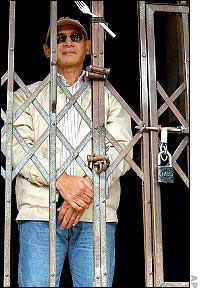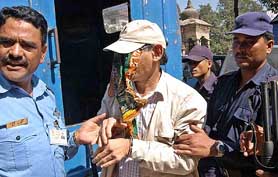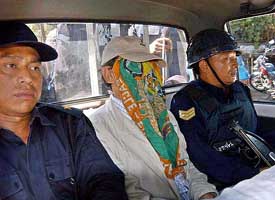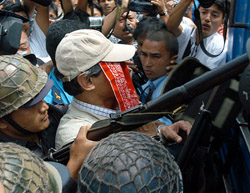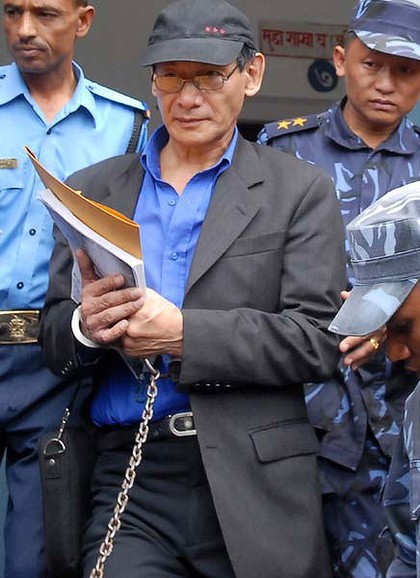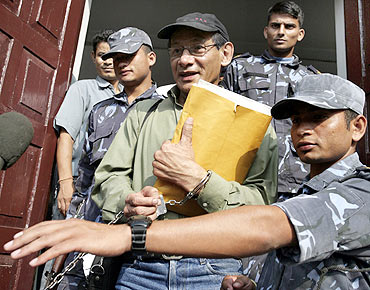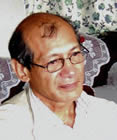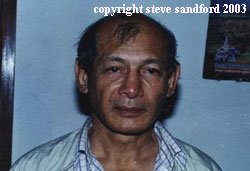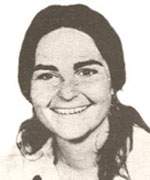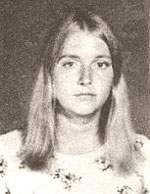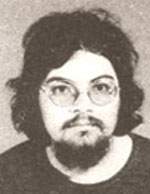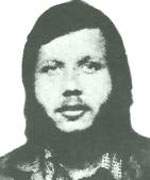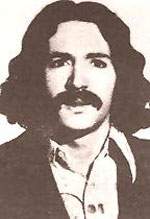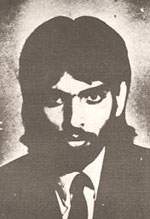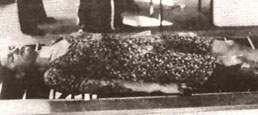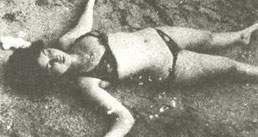Charles Sobhraj
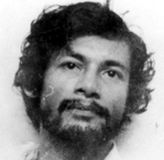
A.K.A.: "The Serpent" - "The Bikini killer"
Classification: Serial killer
Characteristics: Poisoner - Robberies
Number of victims: 10 +
Date of murders: 1975 - 1976
Date of arrest: July 5, 1976 / September 19, 2003
Date of birth: April 6, 1944
Victims profile: Teresa Knowlton / Jennie Bollivar / Vitali Hakim / Henk Bintanja, 29, and his fiancée Cornelia Hemker, 25 / Charmayne Carrou / Laurent Ormond Carrière, 26 / Connie Bronzich, 29 / Avoni Jacob / Ajay Chowdhury / Jean-Luc Solomon
Method of murder: Poisoning - Drowning - Strangulation
Location: Thailand / Nepal / India / Malaysia
Status: Sentenced to 12 years in prison in India in 1976. Released on February 27, 1997. Sentenced to life imprisonment in Nepal on August 20, 2004
Sobhraj, Charles Gurmukh
Born Hotchand Bhawnani Gurmukh Sobhraj, in April 1944, Asia's premier serial slayer was the illegitimate son of a Vietnamese peasant girl and a wealthy Indian merchant living in Saigon.
Soon after his birth, Sobhraj's father married an Indian woman in Pooma, and his mother retaliated by wedding a French military officer when Sobhraj was four years old. The land of Indochina was in turmoil at the time, with French colonial troops fighting a hopeless rear-guard action against Viet Minh communist rebels, and Hotchand Sobhraj witnessed countless acts of violence before his step-father took the family to France in 1953.
Sobhraj hated Europe and the Catholic boarding school in Paris where he soon became the butt of racial jokes and insults. (The school's lasting mark was a name change - to "Charles" - after Sobhraj's clever impersonation of comedian Charlie Chaplin.)
At first, he expressed his displeasure through tantrums and persistent bed-wetting, twice running away to Saigon in his teens. Sobhraj's father sent him back each time, but finally agreed to pay his passage for a trial visit home. The ticket never came, and Sobhraj turned to robbery, landing briefly in jail on his second try.
He finally reached Vietnam on his own, but the family reunion was tense, and Sobhraj was soon packed off to live with relatives in India after wrecking his father's car. When he turned up in Saigon again, uninvited, Charles's father threw in the towel, sending him back to France. In Paris, Charles was locked up twice for auto theft, emerging from jail the second time with a short-lived desire to "go straight."
He married, found a job, but the straight life quickly palled. Jailed again for writing forged checks on his sister's account, Charles was freed when she dropped the charges. He continued bouncing checks thereafter, saving up some 30,000 francs before he took his wife to Bombay , setting up shop as an international con man and smuggler, specializing in the theft of passports from American and European tourists. Arrested for a jewel robbery in Delhi, Charles was granted bail in spite of an escape attempt.
He fled at once to Kabul, in Afghanistan, where he was jailed for auto theft and lesser charges. Another escape brought him back to France, where he kidnapped his infant daughter from his mother-in-law, leaving the woman drugged and locked in a hotel room. Sobhraj's first known murder victim was a Pakistani chauffeur named Habib, hired by Charles and a female companion in September 1972, for a drive between Rawalpindi and Peshawar.
Along the way, for reasons unknown, Charles injected Habib with a drug that took his life, then dumped the driver's body in a river. Warrants were issued for suspect "Damon Seaman," but another year would pass before Sobhraj was finally identified. Arresting him was something else. In November 1973, Sobhraj was in Istanbul, teaming up with his brother Guy to drug and rob wealthy tourists.
Both were arrested in Greece, but Charles managed another escape, leaving his brother in jail as he fled back to India. In Delhi, he entered the heroin trade, gaining a foothold in the cut-throat business with inside information procured - under drugs and torture - from a local pusher whom Sobhraj later killed.
Murder seemed to come easier each time. In October 1975, Sobhraj killed an American tourist, Teresa Knowlton, in his Delhi flat and had a sidekick dump her body. A Turkish competitor in the drug trade, Vitali Hakim, was beaten, his neck snapped, his corpse doused with gasoline and set afire. In Bangkok, Charles strangled Hakim's French contact, one Stephanie Parry. A month later, still in Bangkok, he strangled Dutch tourists Cornelia Hemker and Henricus Bitanja on December 16, burning their bodies as a hedge against arrest.
Shortly before Christmas, Canadian Laurent Carriere and American Connie Bronzick were found dead in Katmandu, their bodies burned. Sobhraj -traveling as Henricus Bitanja, with his victim's passport - had booked a room at the same hotel, but he slipped out of Nepal after preliminary questioning.
The killer continued his aimless trek across Asia, murdering Israeli Allen Jacobs for his passport at Varanasi, in northern India. A few days later, on January 9, 1976, Sobhraj and two accomplices drugged a trio of Frenchmen at Goa, dumping their bodies at roadside, but all three victims managed to survive.
In Hong Kong, Allen Gore was also lucky; he lost $8,000 but kept his life, despite a jolt of Sobhraj's chemical cocktail. Arrested with false passports in Bangkok, Charles was allowed to walk after doling out bribes all around. In Penang, he was arrested for trying to cash stolen traveler's checks, but he managed to talk his way out of jail. Back in Bombay, Sobhraj slipped a fatal mickey to French tourist Jean-Luc Solomon, moving on from there to more ambitious projects.
Shooting for the moon, he drugged an entire class of 60 French engineering students, but miscalculation of the dose sent 20 to a local hospital, and this time police were waiting.
Arrested on July 5, 1976, Sobhraj was linked with at least ten homicides spanning the past three years. Convicted of "culpable homicide" in the Solomon case, Sobhraj was sentenced to seven years at hard labor, with two more years tacked on for drugging the French students.
In 1982, he was sentenced to life imprisonment for the murder of Allen Jacobs, but appeals are continuing. Thailand and Nepal have announced their intention to file murder charges if Sobhraj should manage to win his release.
Michael Newton - An Encyclopedia of Modern Serial Killers - Hunting Humans
Hatchand Bhaonani Gurumukh Charles Sobhraj (born April 6, 1944), better known as Charles Sobhraj, is a serial killer of Indian and Vietnamese origin, who preyed on Western tourists throughout Southeast Asia during the 1970s. Nicknamed "the Serpent" and "the Bikini killer" for his skill at deception and evasion, he allegedly committed at least 12 murders.
He was convicted and jailed in India from 1976 to 1997, but managed to live a life of leisure even in prison. After his release, he retired as a celebrity in Paris; he unexpectedly returned to Nepal, where he was arrested, tried and sentenced to life imprisonment on August 12, 2004. The Supreme Court of Nepal has finally convicted him and ordered the life imprisonment, this decision was made on 30 July 2010.
While Sobhraj is widely believed to be a psychopath — he has a manipulative personality and is incapable of remorse — his motives for killing differed from those of most serial killers. Sobhraj was not driven to murder by deep-seated, violent impulses, but rather for personal gain, as a means among many to sustain his lifestyle of adventure. That lifestyle, as well as his cunning and cultured personality, made him a celebrity long before his release from prison. Sobhraj immensely enjoyed the attention, charging large amounts of money for interviews and film rights; his life has already been the object of four books and three documentaries. This search for attention and overconfidence in his own intelligence are named as causes of his unexpected return to one of the few places on Earth where authorities were still willing and able to arrest him, and his subsequent downfall.
Early years
Sobhraj was born Gurmukh Sobhraj in Saigon to an unwed Vietnamese mother and an Indian (Sindhi) father who soon deserted the family, for which the mother blamed the child. Stateless at first, he was then adopted by his mother's new boyfriend, a French lieutenant stationed in Indochina, but was not given as much attention as the couple's later children. Moving back and forth between France and Indochina with his family, feeling at home in neither place, Sobhraj developed discipline and personality problems growing up and soon turned to petty crime as a teenager.
Sobhraj got his first jail sentence (for burglary) in 1963 at Poissy prison near Paris. He weathered the harsh detention conditions using a combination of self-defense and manipulation. The latter earned him special favors from prison officials, such as keeping books in his cell, and endeared him to visitor Felix d'Escogne.
When paroled, Sobhraj moved in with d'Escogne and shared his time between the high society of Paris and the criminal underworld. He started to accumulate money through a series of scams and burglaries, and began a relationship with Chantal, a woman from a conservative Parisian family. He was arrested for evading police in a stolen car on the very night he proposed to her, and sent back to Poissy for eight months, while a supportive Chantal waited for him.
Sobhraj and Chantal were married upon his release. Soon after, facing mounting suspicions by French authorities, he and a now pregnant Chantal left France for Asia to escape arrest. Traveling through Eastern Europe using fake documents and robbing people who befriended them, they arrived around 1970 in Bombay, where Chantal gave birth to a baby girl.
The couple made a good impression on the expatriate community in India, while Sobhraj resumed his criminal lifestyle by running a car theft and smuggling operation, the profits of which were plowed into his growing gambling addiction. A botched armed robbery at a jewelry store in Hotel Ashoka in 1973 led to his arrest and imprisonment. Faking illness, he escaped with Chantal's help, but both were captured shortly after. Borrowing money from his father in Saigon to bail them out, they fled India for Afghanistan.
In Kabul, the couple resumed their habit of robbing tourists following the "hippie trail." Arrested once again, Sobhraj escaped in a similar manner as in India, pretending illness and drugging the hospital guard, then fleeing to Iran, leaving his family behind. Chantal, although still loyal to him, wanted to leave their criminal past behind, and returned to France, vowing to never see him again.
Sobhraj spent the next two years on the run, using as many as 10 stolen passports and visiting several countries in East Europe and the Middle East. He was joined in Istanbul by his younger brother André, who quickly became a pawn in many crimes in Turkey and Greece; both were eventually arrested in Athens. After an identity-switch plan gone awry, Sobhraj escaped in his usual manner, leaving his brother to serve an 18-year sentence after being turned over to the Turkish police by Greek authorities.
Murders
On the run again, Sobhraj financed his lifestyle by posing as a mysterious drug dealer to impress tourists and defrauding them when they let their guard down. In Thailand, he met Marie-Andrée Leclerc from Lévis, Quebec, one of many tourists looking for adventure in the East. Subjugated by Sobhraj's personality, Leclerc quickly became his most devoted follower, turning a blind eye to his crimes and philandering with local women.
Sobhraj started gathering followers by helping them out of difficult situations, indebting them to him while he actually was the very cause of their misery. In one case, he helped two former French policemen, named Yannick and Jacques, to recover their passports that he himself had stolen; in another, he provided shelter and comfort to another Frenchman named Dominique Rennelleau, whose apparent dysentery illness was actually the results of poisoning by Sobhraj. He was also joined by a young Indian named Ajay Chowdhury, a fellow criminal who became his lieutenant. Sobhraj wanted to start a criminal "family" of sorts, in the style of Charles Manson's.
It was then that Sobhraj and Chowdhury committed their first (known) murders in 1975. Most of the victims had spent some time with the "clan" before their deaths and were, according to some investigators, potential recruits who had threatened to expose Sobhraj. The first victim was a young woman from Seattle, Teresa Knowlton, who was found burned like many of Sobhraj's other victims. Soon thereafter, a young American Jennie Bollivar, was found drowned in a tidal pool in the Gulf of Thailand, wearing a flowered bikini. It was only months later that the autopsy and forensic evidence revealed the drowning to be murder.
The next victim was a young, nomadic Sephardic Jew named Vitali Hakim, whose burned body was found on the road to the Pattaya resort where Sobhraj and his clan were staying.
Dutch students Henk Bintanja, 29, and his fiancée Cornelia Hemker, 25, were invited to Thailand after meeting Sobhraj in Hong Kong. Just as he had done to Dominique, Sobhraj poisoned them, and then nurtured them back to health to gain their obedience. As they recovered, Sobhraj was visited by his previous victim Hakim's French girlfriend, Charmayne Carrou, coming to investigate her boyfriend's disappearance.
Fearing exposure, Sobhraj and Chowdhury quickly hustled the couple out; their bodies were found strangled and burned on December 16, 1975. Soon after, Carrou was found drowned in circumstances similar to Jennie's, and wearing a similar-styled swimsuit. Although the murders of both women were not connected by investigations at the time, they would later earn Sobhraj the nickname of "the bikini killer."
On December 18, the day the bodies of Bintanja and Hemker were identified, Sobhraj and Leclerc entered Nepal using the couple's passports. There they met and, on December 21-22, murdered Canadian Laurent Ormond Carrière, 26 and Californian Connie Bronzich, 29. (The two victims were incorrectly identified in some sources as Laddie DuParr and Annabella Tremont.) Sobhraj and Leclerc then returned to Thailand, once again using their latest victims' passport before their bodies could be identified.
Upon his return to Thailand, Sobhraj discovered that his three French companions had started to suspect him, found documents belonging to the murder victims, and fled to Paris after notifying local authorities.
Sobhraj then went to Calcutta, where he murdered Israeli scholar Avoni Jacob for his passport, and used it to move to Singapore with Leclerc and Chowdhury, then to India and - rather boldly - back to Bangkok in March 1976. There they were interrogated by Thai policemen in connection with the murders, but easily let off the hook because authorities feared that the negative publicity accompanying a murder trial would harm the country's tourist trade.
Not so easily silenced, however, was Dutch embassy diplomat Herman Knippenberg, who was investigating the murder of the two Dutch backpackers, and suspected Sobhraj even though he did not know his real name. Knippenberg started to build a case against him, partly with the help of Sobhraj's neighbour. Given police permission to conduct his own search of Sobhraj's apartment (a full month after the suspect had left the country), Knippenberg found a great deal of evidence, such as victims' documents and poison-laced medicines. He would from then on accumulate evidence against Sobhraj for decades, despite the lack of cooperation by law enforcement.
The trio's next stop was in Malaysia, where Chowdhury was sent on a gem-stealing errand, and disappeared after giving the jewels to Sobhraj. No trace of him was ever found, and it is widely believed that Sobhraj murdered his former accomplice before leaving with Leclerc to sell the jewels in Geneva.
Soon back in Asia, Sobhraj started rebuilding his clan, starting in Bombay with two lost Western women named Barbara Sheryl Smith and Mary Ellen Eather. His next victim was Frenchman Jean-Luc Solomon, who succumbed to the poison intended to incapacitate him during a robbery.
In July 1976 in New Delhi, Sobhraj and the three women tricked a tour group of post-graduate French students into accepting them as guides. He then drugged them with pills which he pretended were anti-dysentery medicine. However, when the drugs started acting too quickly and the students started dropping unconscious where they stood, three of them quickly realized what was happening and overcame Sobhraj, leading to his capture by police. During interrogation, Barbara and Mary Ellen quickly cracked and confessed everything. Sobhraj was charged with the murder of Solomon, and all four were sent to Tihar prison outside New Delhi while awaiting formal trial.
Prison time
Conditions inside the notorious prison were unbearable; both Barbara and Mary Ellen attempted suicide during the two years before their trial. Sobhraj, however, had entered with precious gems concealed in his body and was experienced in bribing captors and living comfortably in jail.
Sobhraj turned his trial into a show, hiring and firing lawyers at whim, bringing in his recently-paroled and still-loyal brother André to help, and eventually going on a hunger strike. He was nonetheless sentenced to 12 years in prison instead of the expected death penalty. Leclerc was found guilty of the drugging of the French students, then later paroled and returned to Canada when she developed ovarian cancer. She was still claiming her innocence, and reportedly still loyal to Sobhraj, when she died at home in April 1984.
Sobhraj's systematic bribery of prison guards at Tihar reached outrageous levels. He led a life of luxury inside the jail, with TV, and gourmet food, having befriended both the guards and the prisoners. He would walk in and out of jail whenever he wanted. Revelling in his notoriety, he gave interviews to Western authors and journalists, such as Oz magazine's Richard Neville in the late 1970s, and Alan Dawson in 1984. He freely talked about his murders, while never actually admitting to them, and pretended that his actions were in retaliation against Western imperialism in Asia, an excuse which most criminologists find highly doubtful.
He also needed to find a way to prolong his sentence, since the 20-year Thai arrest warrant against him would still be valid on his intended release date, leading to his deportation and almost certain execution. So in March 1986, on his tenth year in prison, he threw a big party for his prisoner and guard friends and, having drugged them with sleeping pills, walked out of the jail.
Sobhraj was quickly caught in Goa and had his prison term prolonged by 10 years, just as he had hoped. On February 17, 1997, 52-year old Sobhraj was released, with most warrants, evidence and even witnesses against him long lost. Without any country to deport him to, Indian authorities let him return to France.
Celebrity and re-capture
Sobhraj then lived in the suburbs of Paris, enjoying a comfortable retirement. He hired an agent and charged thousands of dollars for interviews and photographs, and upwards of $15 million for a movie deal based on his life. Meanwhile, families of victims, and investigators such as Knippenberg, despaired of seeing justice served.
Then, on September 17, 2003, Sobhraj was unexpectedly spotted by a journalist in a street of Kathmandu and quickly reported to the local authorities. He was arrested two days later by Nepalese police in the casino of the Yak and Yeti hotel. On August 20, 2004, the Kathmandu District Court sentenced him to life imprisonment for the 1975 murders of Bronzich and Carrière. Most of the evidence against him came from the painstaking accumulation of documents by Knippenberg and Interpol.
Sobhraj's motives for returning to Nepal remain unknown, although arrogance and need for attention likely had a part in it. He appealed the conviction, claiming he was sentenced without trial. In September, his lawyer announced Sobhraj's wife in France would file a case against the French government before the European Court of Human Rights, for refusing to provide him with any assistance. His conviction was confirmed in 2005 by Kathmandu's Court of Appeals.
Current status
In late 2007, news media reported that Sobhraj's lawyer had appealed to the current French president, Nicolas Sarkozy, for intervention with Nepal.
In 2008, Sobhraj announced his engagement to Nihita Biswas (aged 20) from Nepal. On 7 July 2008, issuing a press release through his fiancée Nihita, he claimed that he was never convicted of murder by any court and asked the media not to refer to him as a serial killer. Later, it was claimed that he married his fiancée on October 9, 2008, on the occasion of Bada Dashami, a Nepalese festival, in a much famed, but not publicised, wedding that took place in the jail itself.
On the following day, Nepalese jail authorities dismissed the claim of his marriage. They said that Nihita and her family had been allowed to conduct a tika ceremony, along with the relatives of hundreds of other prisoners. They further claimed that it was not a wedding but part of the ongoing Dashain festival, when elders put the vermilion mark on the foreheads of those younger to them to signify their blessings.
In July 2010, the Supreme Court of Nepal postponed the verdict on an appeal filed by Sobhraj against a district court's verdict sentencing him to life imprisonment for the murder of American backpacker Connie Jo Bronzich in 1975. Sobhraj had appealed against the district court's verdict in 2006, calling it unfair and accusing the judges of racism while handing out the sentence.
On July 30, 2010 the Nepalese Supreme Court upheld the verdict issued by the district court in Kathmandu of a 20-year life term for the murder of US citizen Connie Jo Bronzich and another year plus a Rs 2,000 fine for using a fake passport to travel. The seizure of all his properties was also ordered by the court. His mother-in-law/lawyer and his wife, Nihita, expressed that they were dissatisfied with the verdict and Thapa claimed that Sobhraj had been "denied" justice.
Sobraj currently has another case pending against him in the Bhaktapur district court for the murder of Laurent Armand Carrière, a Canadian-born tourist.
Pop culture
In the episode "Slither," part of the fifth season of Law & Order: Criminal Intent, the character of Bernard Fremont (played by Michael York) is clearly based on Charles Sobhraj. Fremont is killed (offscreen), most likely by his former lover and accomplice Nicole Wallace (played by Olivia d'Abo), who may have been partly based on Leclerc or Chantal.
Bibliography
Julie Clarke & Richard Neville (1980). The Life and Serious Crimes of Charles Sobhraj. Pan Macmillan. ISBN 0-330-27001-X.
Thomas Thompson (1979). Serpentine. Carroll & Graf Publishers. ISBN 0-7867-0749-6.
Julie Clarke & Richard Neville (1989). Shadow of the Cobra. Penguin Books Ltd. ISBN 978-0140129373.
Farrukh Dhondy (2009). The Bikini Murders. Harper Collins India
Films
The made for TV movie Shadow of the Cobra (1989) is based on Sobhraj
Charles Sobraj: The Tale of the Serpent
Crime Does Pay
Imagine that you could earn nearly a million dollars for every year you spent in prison with the understanding that you would likely get out in the prime of your life. Would you take that deal?
More specifically, suppose you could live like royalty behind bars, in almost total control, with guests free to come and go as they pleased, cellphones, TV, gourmet food and fine wine to eat and drink. Would that make the deal worth 20 years of your life?
For serial murderer Charles Sobhraj, the idea of retiring to Paris and making $15 million for a movie deal based on his life made spending more than two decades in a notoriously corrupt Indian prison worthwhile. Sobhraj, a Vietnamese-Indian by birth and French national by adoption, turned a sentence for homicide in India into almost a life of leisure while at the same time evading prosecution for a dozen murders in jurisdictions that should have brought a death sentence.
He was a con man, jewel thief, drug dealer and murderer, but one who lived a life of adventure and intrigue that made him a media celebrity. He amassed enough money to bribe his captors who provided him with amenities to make life in an Indian prison more bearable. For most of his incarceration he had access to typewriters, a television, refrigerator and a large library. That's in addition to the drugs and food that he used to entertain and control his fellow inmates in the prison that was supposed to be the harshest in India.
Even more vexing was the idea that, at 52 years old, Sobhraj could walk out of Delhi's Tihar prison, sign a $15 million deal for his life story and then charge the media upwards of $5,000 an interview once he returned to Paris.
Not bad for a man who was convicted of one homicide and accused of committing at least 10 more. Some authorities believe Sobhraj killed more than 20 unsuspecting European and American tourists and pilgrims who journeyed to the Far East and the subcontinent. Some came east in search of drugs and others came in search of spiritual growth. Instead, they found Charles Sobhraj and his gang of killers.
Sobhraj wanted to create a family-like cult of sorts with himself as the father figure, says Dutch diplomat Herman Knippenberg, who spent years trying to bring Sobhraj to justice. Knippenberg said Sobhraj wanted to create "his own family of Charles Manson-like characters, with himself as the father. The ones he killed were the people who saw through his mask and who tried to get away."
Today, you may be able to find Charles Sobhraj idling away his days in a Paris bistro and for a fee he may even sit down and talk about his life.
He has slipped easily into the life of a celebrity, with mainstream publications willing to pay for posed pictures of the murderer enjoying the good life. In the words of his agent: "No money, no meeting."
The friends and relatives of his victims only hope that karma -- the concept that says the collective force of a man's actions dictates his destiny -- isn't done yet with Charles Sobhraj.
Motive
Early childhood abuse, injury to the brain -- usually the frontal lobes -- and extremely indifferent or cruel parenting are often found in the backgrounds of serial killers. But what made Charles Sobhraj evolve into a psychopath? Could the constant travel back and forth between his natural parents and the ensuing rejection be enough to drive a man to serial homicide? Recent scientific research into the minds of psychopaths provides a different theory.
"Until the psychopath came into focus, it was possible to believe that bad people were just good people with bad parents or childhood trauma and that, with care, you could talk them back into being good," writes journalist Robert Hercz. “(Noted criminologist Bob Hare's research suggested that some people behaved badly even when there had been no early trauma.")
A professor at the University of British Columbia, Hare has spent years studying psychopaths to try to address what has turned out to be a common malady. Through decades of research, interviewing and conducting experiments on some of society's most notorious criminals, Hare developed a commonly used measurement scale to determine a subject's level of "psychopathy." What he has learned is troubling.
"Hundreds of thousands of psychopaths live and work and prey among us. Your boss, your boyfriend, your mother could be what Hare calls a 'subclinical' psychopath, someone who leaves a path of destruction and pain without a single pang of conscience," Hercz writes. "Even more worrisome is the fact that, at this stage, no one -- not even Bob Hare -- is quite sure what to do about it."
Hare's research helps explain the behavior of men like Charles Sobhraj. Unlike many serial killers, Sobhraj killed for economic and personal gain. He only wanted the passports and identity papers of his victims because that made it easier for his jewel and drug smuggling operations. Sobhraj wasn't driven to kill by perverse sexual desire, nor did he get any particular satisfaction out of homicide. The people he murdered were merely in the way. They had something that Sobhraj wanted and so he took it.
“If I have ever killed, or have ordered killings, then it was purely for reasons of business, just a job, like a general in the army,” Sobhraj told journalist Richard Neville during his trial in India.
Psychopaths like Sobhraj are incapable of feeling remorse. To them, the phrases "I want to kill you" and "I want to kiss you" carry the same emotional punch. The concept of fear is almost unknown to them, so threat of punishment will never be a deterrent.
Within the psychopath diagnosis is a subdivision of behavior that analysts call "the puppet master." This class is made up of men like Charles Sobhraj, although killers like Charles make up only a small portion of the puppet masters out there.
"The puppet master would manipulate somebody to get at someone else. This type is more powerful because they're hidden," Hare said.
Industrial psychologist Paul Babiak attributes a trio of motivations to psychopaths: thrill-seeking, an almost insatiable desire to win, and the propensity to injure others. "They'll jump on any opportunity that allows them to do those things," he says. "If something better comes along, they'll drop you and move on."
In one of Charles Sobhraj's earliest encounters with crime, he once explained to his mother that he could "always find an idiot to do what I wanted." The comment came when 10-year-old Charles was accused of inducing a stepbrother to rob a shopkeeper.
Hare talks about how imprisoned psychopaths learn "the words but not the music" that parole boards and society want to hear. "They can repeat all the psychiatric jargon -- 'I feel remorse,' they talk about the offense cycle -- but these are words, hollow words."
Abandonment
The constants in Charles Sobhraj's formative years were abandonment and second-class status. Born Gurhmuk Sobhraj to an unwed Vietnamese woman, Sobhraj grew up feeling his parents' indifference to his existence. His mother, Song, was abandoned by the Indian tailor soon after her first son was born and she blamed him for her lover's dismissal.
His father wanted little to do with Gurhmuk during the boy's childhood, but the youngster twisted it around in his head to believe that his father was a mythic, heroic figure.
Eventually Song met up with a French officer stationed in French Indochina and they were wed. The soldier, Lieutenant Alphonse Darreau, was willing to adopt Song's son, but not to give the boy his name. Darreau was kind to Sobhraj, but as other children were born to Darreau and Song, Gurhmuk began to feel more and more an outsider in his own home. For his part, Darreau, who had suffered shell shock during a battle and for the rest of his life was in and out of hospitals for post-traumatic stress disorder, looked at Sobhraj as a drain on scarce family resources.
A child shunned in such a way will eventually do things to gain attention. For neglected children, even negative attention is considered better than no attention at all, and Charles (he took the name as a teenager after being baptized a Catholic) was no different. From an early age he was disobedient and delinquent. He was a smart, charismatic youngster, but his grades suffered and he was often absent from school.. When he did show up Charles was a discipline problem for his schoolmasters.
Living in Marseilles, Charles had access to ships heading east to Indochina and he began stowing away on them in an effort to reach his natural father. The affection Charles held for his father was not returned, however. Several times the boy managed to make it out of Marseilles only to be discovered while at sea and returned to port -- at no small cost to his mother or father, depending on who could be convinced to pay the boy's fare.
Charles bounced back and forth between the Orient and Europe, at home in neither place. The geographic cure his parents hoped for never occurred, because wherever Charles went he took his psychopathic personality. He was uncontrollable and as he reached his late teens his family became unwilling to bail him out of trouble.
When he was arrested for burglary in Paris and sentenced to three years behind bars, he went to prison, estranged from his family. Alone, without anyone who cared whether he lived or died, Sobhraj was determined to make his family and all society pay for throwing him away.
Some consider this need for vengeance a pretense.
“His claims that his life was a protest against the French legal system or that his love for Vietnam and Asia motivated his criminal career are absurd, but as tools of psychological manipulation they were very effective,” Neville wrote.
Felix
The year 1963 would be the first of many behind bars for Sobhraj, and he quickly adjusted to life in prison. It was brutal and cruel, and a small half-Asian teen like Charles should have been fresh meat for predators in jail. However, Charles knew karate and he used it to defend himself.
Poissy Prison near Paris was a terrible place. It was built in the 16th century as a convent and converted into a prison by the agnostics of the French Revolution. High stone walls separated prisoners from the outside world, and the individual cells were so small they were used only for sleeping -- during the day the prisoners were lumped together in pens sorted into groups based on their ferocity, sanity and nationality.
"It is a horror," Sobhraj biographer Thomas Thompson quotes a visitor as saying. "One enters the place and chills pass through the bones like stepping into a cellar. Each moment I am inside, I am repelled."
Sobhraj's behavior in jail was indicative of things to come. Prisoners were forbidden to keep books in their cells, but not Charles. Infractions that would have brought harsh punishments were not enforced around Sobhraj, and he portrayed himself as so pathetic he attracted the special attention of one of the volunteers who visited prisoners. The man, Felix d'Escogne, was a wealthy young man who came to Poissy each week to help prisoners with letters, resolve simple legal issues and to provide companionship. Charles quickly latched on to Felix, whom he treated as a savior and role model.
The men struck up a friendship during the time Charles was imprisoned and Felix even tried to reconcile father and son, as well as Charles with his mother, with limited success. He provided Charles with reading material, emotional stability and encouragement as the young man idled away his days in Poissy.
After he was paroled, he moved in with his friend Felix and resumed his criminal lifestyle, but he was much more adept and cautious. He straddled two very different worlds. In one, the bright world of Felix d'Escogne, was filled with work and service, and interaction with some of the best Parisian families. The other world was the darker, more sinister place where Charles Sobhraj felt at home -- the Parisian underworld.
Charles' own self-destructive behavior sent him back to jail on the very night he proposed to his fiancee. He had stolen a car and taken the woman, Chantal, to a glamorous casino. Crazed, almost frenzied wagering caused him to lose thousands of borrowed francs for which he blamed Chantal, who had put off his requests to marry him. Later, with Chantal white with fear beside him, he sped home at breakneck speed until Chantal agreed to be his bride.
It was at that time he noticed les flics in the patrol car behind them, siren wailing and lights flashing. He tried to evade the police but lost control on a rain-soaked curve and crashed the car. He was arrested and sent back to Poissy for eight months for evading police in a stolen car.
At the time of his sentencing, Felix wrote a warning to the judge, advising that mandatory psychological counseling be part of any sentence. He explained his request by listing some of Sobhraj's behaviors.
"He exploits 100 percent the weaknesses of those around him," Thompson reports that Felix wrote the judge. "He has a small conscience, if any ... is capable of politeness, but calculatedly so. Impulsive and aggressive."
Chantal
Chantal was a beautiful young Parisian woman living at home with her parents when she met Charles Sobhraj at a party. Instantly she was taken with the erudite, well-heeled young man who told her of his adventures in the Orient and Dakar and his fictitious wealthy family back in Saigon.
He spoke like a poet and courted young Chantal, despite her parents' initial disapproval of their daughter's new beau. There was no way her father, a traditional French Catholic, would allow his daughter to marry a Vietnamese half-breed, no matter how rich he said his family in Vietnam was. But Chantal was smitten and when Sobhraj was sent back to prison for an additional eight months, she stood by him, pledging chastity and telling her friends and co-workers that her boyfriend had been called up by the military.
Constitutionally unable to see fault with himself, Charles blamed the world for his latest run-in with the law. He did his time quietly, but in a series of letters to Felix, he denied responsibility for his actions.
By the time he was released eight months later, Sobhraj had built up a rather nice nest egg through a series of scams. The money made Chantal's parents a little more amenable to their daughter marrying Charles and they were wed in a simple civil ceremony attended by representatives of both families.
Shortly afterward, Chantal revealed she was pregnant. At the same time Charles decided to leave Europe and head to the Orient before the life of scams and cons he was living caught up with him. He was passing bad checks all over France and it was only a matter of time before the police realized that the common link to a rash of burglaries in wealthy homes was that Charles Sobhraj had recently been on the premises.
Asking Felix, who had re-entered his life, if he could borrow a car for a day or two, Charles loaded his worldly possessions and his pregnant wife and left France. The couple worked their way across Eastern Europe passing bad paper, robbing people who befriended them and leaving a trail of crimes and victims in their wake. By the time they reached Istanbul in Felix's stolen MG, authorities had been visiting their friends in Paris, looking for the couple. In Bombay, Chantal gave birth to a baby girl.
India
Charles and Chantal integrated into expatriate French society on the subcontinent. Charles, the highly personable and intelligent psychopath, was quickly accepted by some of the highest-ranking French citizens in India and Chantal, an attractive and personable young woman with an adorable baby was just as welcome at the women's teas and parties.
This early in their marriage, Chantal was still blissfully unaware of her husband's thieving ways. He would talk to her about his "business," and on more than one occasion she would act as unwitting accomplice to his schemes, but for a stretch of several months he operated successfully without police interference.
During much of 1970, Sobhraj operated a stolen car brokerage operation, obtaining hard-to-find American and European autos for homesick Frenchmen and wealthy Indians with a passion for Western cars.
Charles would either steal the cars or fence stolen cars in Pakistan or Iran then bring them over the border to India, greasing the palms of greedy Indian border guards who were willing to overlook the lack of import paperwork. He would gain legitimate title to the vehicles by turning them in as stolen and buying them back at auction. Then he would sell them to grateful friends at great profit.
His business put him on the road much of 1970 and 1971, leaving a lonely and homesick Chantal in Bombay often wondering where Charles had gone. To appease her, he brought her back beautiful jewelry from God knows where..
Charles' only weakness seemed to be compulsive gambling, and this disease would result in his second serious run-in with the law and ultimately his downfall.
Charles lost lots of money at the Macao casino, prompting a liquidation of the jewels he gave to Chantal. Pawning the jewelry was insufficient to pay his gambling debts, literally putting his life at risk from casino collectors who are much more ruthless than their American and European counterparts.
Luckily, Charles was introduced to a Frenchman who had a plan to obtain enough money for Charles to pay off his debts, but also to live quite comfortably for some time.
The jewel store robbery was doomed from the start. Breaking into a hotel room above a store in the swank Hotel Ashoka in Delhi, India, Charles and his crew intended to drill through the hotel floor and drop down into the store during the night. But after three days of drilling with little progress it was clear the plan would fail.
The criminals then lured the owner of the store, blissfully unaware of the drilling going on above his head, up to the room on the premise of meeting a rich client. Sobhraj obtained the keys to the store at gunpoint and proceeded to empty the cases.
Fleeing to the Delhi airport with a bagful of stolen gems, Charles was forced to abandon his loot at customs when the store owner escaped his bonds and notified police, who sealed off the airport. Charles left $10,000 in cash and even more in jewels as he returned empty-handed to Bombay.
Bombay was too appealing to a thief like Charles. Besides, Chantal and the baby were still there so he again took up his car theft scam. Shortly after returning to Bombay he was pulled over by police in a stolen vehicle and based on eyewitness identification, he was arrested for the attempted jewel robbery at the hotel. He was taken to Bombay's prison, Tihar, and from there he staged the first of his dramatic prison escapes.
Pretending to have a bleeding ulcer, Charles was taken to a local hospital where he was diagnosed as having appendicitis, even though there was nothing wrong with him. Recovering from a needless surgery, Charles convinced Chantal to help him escape from the hospital by drugging his guard. Chantal crawled under the covers in Charles' bed and took a dose of chloroform herself to allay suspicions that she had conspired to help her husband escape.
He was recaptured shortly after, and both Chantal, whose unconsciousness had failed to convince police of her "innocence," and Charles were taken into custody. Chantal was released shortly after on bail. Eventually Charles was able to post bail with money borrowed from his father in Saigon and they fled India.
Arrests and Escapes
In Kabul, Afghanistan, Charles supported his wife and child by running cons and robbing hippies who had come east following the hashish trail from Europe. The Sobhrajs lived comfortably in Kabul, but soon wanderlust struck Charles and he took his family to the airport. He had neglected, however, to pay the hotel for two months of rent and was arrested by Afghan police.
Again he plotted an escape. In Afghan prisons, inmates are responsible for obtaining their own food by employing runners, often young beggars. If an inmate has no money, he starves. Charles had his runner purchased a syringe with which he drew his own blood and drank it, making it look like he had an ulcer. Taken to the hospital, he managed to drug his guard once again and flee to Iran.
For the next year he flew around the Eastern Hemisphere in a scattered manner, never settling anywhere long enough to arouse the suspicions of the police, although he continued to support himself by theft.
He often traveled with as many as 10 passports, some bought, some stolen, and none with the name Charles Sobhraj. Charles no longer used his given name, instead he changed identity at the drop of a hat depending on the passport he held. He would later tell police that during 1972-1973 he traveled to Karachi, Pakistan, Rome, Teheran, Kabul, Yugoslavia, Bulgaria, and as far north as Copenhagen.
Abandoning his family in Kabul, Charles saw his marriage end. The loyal Chantal, now with a dossier of her own in the massive Interpol database, had had enough of her criminal husband and left for France. Once there, she prayed she would never see Charles Sobhraj again.
By the time Chantal fled to Paris, the places Charles Sobhraj could travel to were quickly becoming limited. He was joined in Istanbul by his younger brother Andre -- the same person he had called "an idiot willing to do his bidding" as a 10-year-old -- who became an active participant in Charles' scams. Andre pledged obeisance to his older brother when Charles told him he could never return to France because of his criminal record, but the younger man suggested they find other countries in Europe to plunder.
Looking East, Charles told Andre he saw a world where he could blend into the crowd -- his Indian-Vietnamese heritage allowed him to portray any nationality he wanted -- and where police were more "accommodating" if the price was right. Rejecting Andre's suggestion that they return to Europe, Charles decided to return to the Orient.
Ultimately, Andre would pay dearly for his foolish desire to follow his brother. They pulled a couple of minor heists in Turkey, then fled to Greece when things got too hot and robbed a few tourists in Athens before they were arrested following a minor jewel robbery. Charles banked on the hope that the Greeks and Turks, historic enemies, would never share information about the two brothers who preyed on tourists.
Charles convinced Andre that it would be easy to make authorities think Charles was Andre and Andre Charles. Sobhraj was a wanted man, and if he pretended to be Andre -- whose crimes were minor in the eyes of Greek justice -- he could walk out of prison in a few weeks. Later, when he was safely across the frontier, Andre could tell the Greeks that he was the real Andre Darreau and that they had released the wrong man. They would then let him free.
The plan nearly worked, but when the Greeks decided to throw the book at the two men, Charles was forced to fall back on another plan. Once again feigning illness, he managed to escape from a police van taking him from a hospital to prison and he disappeared.
In a few days, Andre went to the warden and revealed that they had let Charles Sobrhaj, not Andre Darreau, escape. Sadly for him, the angry Greeks opted to turn Andre over to their Turkish enemies, who were not prepared to be lenient. After a trial, Andre was convicted of theft and sentenced to 18 years at hard labor.
The Poisoner
With his brother languishing in a Turkish prison, Charles fled eastward. He flitted around India, Kashmir, Iran and the Near East operating small-time scams and frauds. His typical modus operandi was to find a French or English-speaking tourist couple, befriend them and impress them as a mysterious, wealthy dealmaker and either use them as jewel couriers or steal their bankrolls, passports and travel tickets.
As he was perfecting this scheme he met the woman who would become his closest confidant and accomplice. She was Marie LeClerc, and she had come to the East looking for adventure. She found it with Charles Sobhraj.
Charles met Marie, a French Canadian, while she was sightseeing, and managed to convince her to return to Bangkok after her vacation ended. When Marie returned to the Orient with a satchel full of love letters Charles had written her during their months apart, she was shocked to find that he had linked up with a Thai woman named May, whom he had described as his “secretary.”
Marie's love for Charles was pathological. She was unable to see any evil in him and was even willing to put up with his dalliances. Years later, as she languished in Tihar Prison awaiting trial, she wrote to Charles (who had found a new lover): "Roong is twelve years younger than I, and fresher. You need a woman who can live under any conditions, any climate. As for me, I'm old, tired, rarely dynamic or smiling, with a bitter character that can't adapt due to my advanced age ... Roong must remain with you. The important thing is that you don't find yourself alone, that you have someone who loves you."
Undoubtedly, Sobhraj believed there was enough of him to share between two women. Somehow, Charles convinced Marie to become his partner in crime and they met up with an Australian professor and his wife who were vacationing in Thailand. Inserting himself into their lives, Charles skillfully won over the Australians who thought they had discovered a real friend. Charles and Marie served the Aussies coconut milk laced with powerful sedatives. When the couple was asleep, Charles ransacked their hotel room, stealing several thousand dollars in cash, as well as their passports, wedding rings and plane tickets.
Just as another man named Charles had done half a world away a few years before at the Spahn Ranch in California, Sobhraj began building a "family" of sorts, with himself as the head. As May floated around the periphery, Charles and Marie took in a wandering French boy named Dominique. Over a period of days Charles subtly administered enough poison to make Dominique ill with what appeared to be dysentery. Charles graciously offered the use of his home while the boy recovered. Normally, dysentery resolves itself quickly (or kills its host through dehydration), but Dominique had a hard time recovering. In reality, Sobhraj was keeping Dominique off balance to make him dependent.
Once it was made clear that Dominique was in Charles' debt, and the boy accepted his position, his recovery accelerated. As the youth grew healthy, Charles added two more young men, Yannick and Jacques, former police officers in the French colonies. Rather than poison them, he wooed them with wine and song, and while they were enjoying a night out on the town with Marie, Charles slipped away and stole their passports and savings.
Do not worry, he assured the two frantic young men, they could stay with him while new passports were procured in Bangkok. Any remuneration would be worked out later.
The final addition to Charles' circle was a young Indian named Ajay Chowdhury. As cold as Charles, Ajay quickly became his lieutenant and accompanied him everywhere. Ajay was a confidant, accomplice and co-conspirator for Charles who could be counted on to come through in even the most delicate circumstances.
The Bikini Murders
After assembling his coterie, Charles Sobhraj began to kill. There were rumors that he had killed before but for the first time Charles began leaving a trail.
His first victim was an American pilgrim named Jennie Bollivar who had come east to find herself through meditation and immersion into a Buddhist lifestyle. Instead, she made the mistake of falling in with Charles and his crowd for a few days. Why Charles murdered Jennie isn't clear, but the Dutch diplomat Herman Knippenberg believes Sobhraj killed her after she refused to join his entourage and become a smuggler.
Jennie was found dead in a tide pool in the warm waters of the Gulf of Thailand, wearing a simple flowered bikini. At first it appeared the beautiful young woman had drowned after a night of hashish and beer, but months later when an autopsy was performed, the forensic evidence made it clear someone had held her head under water until she drowned.
The next victim was a young nomadic Sephardic Jew, Vitali Hakim, who like Jennie, had come east looking for life's meaning, but instead fell into Charles' trap and found death. Vitali moved in with the entourage and stayed for several days. He accompanied Ajay and Charles on a trip to a nearby resort town on the Gulf of Thailand and, according to Charles, opted to stay with friends he had met there. Yannick and Jacques were puzzled by this, because Vitali had left his clothes in a closet in the apartment and had turned over his passport and traveler's checks to Charles for safekeeping.
Several days later, a horribly burned body was found on the road to Pattaya -- the resort destination of Charles, Vitali and Ajay. The male body showed signs of having been beaten, but it was clear to police that the poor man had been alive when he was doused with gasoline and set ablaze. Police assumed the man had been set upon by Thai bandits and slain. They did not connect this murder with the death of Jennie Bolliver.
In December 1975, Vitali Hakim's friend came east looking for him. His hotel noted that Hakim had checked out several weeks earlier and never returned. Vitali had left a message for his girlfriend, however, and unwittingly drew another victim into Charles's murderous web. Charmayne Carrou, a French citizen, turned up dead in circumstances almost identical to Jennie's death. Apparently she traced Vitali's whereabouts to Charles Sobhraj and started asking too many questions. Months later when an autopsy was performed, officials discovered that Charmayne had been strangled, not drowned, and that she had been suffocated with such force that bones in her neck shattered.
Love and Death
Two couples were Charles' next victims. Although they were separated by time and space, they would share the same horrible fate at the hands of the man who had become known to police as the Serpent.
Henk Bintanja and his fiancée, Cornelia "Cocky" Hemker, were Dutch students traveling around Southeast Asia when they met Charles Sobhraj in Hong Kong. He introduced himself as Alain Dupuis, a gem dealer, and quickly ingratiated himself with the two frugal Dutch. As a special favor, Charles sold Cocky a sapphire ring for $1,600 and invited them to his "luxurious villa" in Bangkok. He had to leave before them, he said, but would send a car and driver to meet them at the airport.
Henk and Cocky quickly met the same fate as so many others, mysteriously falling ill, and began recuperating at Charles' apartment. Charles took special care of the Dutch couple, locking up their valuables in his safe, along with their passports.
The night Charmayne Carrou appeared at Charles' apartment, Henk and Cocky were quickly hustled out of the building despite their illness. No one questioned Charles and Ajay when they returned a short time later smelling of gasoline and covered in dirt. Charles offered no explanation, but Dominique and the two former flics were becoming suspicious.
The Bangkok papers trumpeted the news about two tourists who had been bushwhacked by bandits and murdered. The man and woman had been strangled before their bodies were set ablaze. No identification had been found. The papers speculated about how the two doomed lovers met their fate for a few days until the discovery of a second drowned Western woman pushed the story off the front page.
Entering Nepal using Henk's passport, he met a pair of wandering Westerners in Katmandu. Laddie DuParr and Annabella Tremont met in Nepal and quickly became friends. Laddie had come from Canada to climb Mount Everest and Annabella was a restless California girl looking for meaning in her life. They spent a good deal of time in the section of Katmandu called "Freak Street" where anyone could buy anything from hashish to rubies. Laddie was biding his time until the weather cleared and Everest was climbable and Annabella was just biding her time.
Details are sketchy about how they met Charles Sobhraj in Katmandu, but it wasn't long before a man's body was found in a field, burned and slashed with a knife. While authorities were trying to identify the body -- it was clear it was a Westerner because of the size -- a second Westerner's body, positively identified as Annabella, was found nearby. She had been stabbed several times in the chest.
Police got their first lead when Nepalese customs reported that Laddie DuParr had left the country very shortly after the estimated time of Annabella's death. They surmised that Laddie had killed his new girlfriend and fled the country as soon as possible. They were confused, though, about the identity of the Western male who had been found nearby.
On the Run
Of course, it was not Laddie DuParr who fled Nepal after killing Annabella. Charles used Laddie's passport to fly home to Bangkok where he sold some jewels Laddie had purchased in Delhi. Then, using the passport of Henk Bintanja, he returned to Katmandu the next day. Police managed to trace the last few days of Laddie and Annabella and when they caught up with Charles, Marie and Ajay, the trio managed to bluff their way through questioning.
While he was in Bangkok, Charles had made a startling discovery. Dominique, Yannick and Jacques had put the pieces together and realized they had been under the care of a homicidal maniac. They broke into Charles' office and found dozens of passports and identity papers belonging to unfortunate tourists who had met up with Sobhraj. The three Frenchmen fled Sobhraj's apartment and Thailand, heading home to Paris. Before they left they told police what was going on in the apartment building.
On the run from Nepalese authorities, Charles and company crossed the border into India and made their way to Calcutta. They fit well in what is perhaps the most poverty-stricken place on the planet. Charles had no money, knew he was wanted by Nepalese police and could only guess what was waiting for him back in Bangkok. But he believed he was superhuman and that no mere mortal could bring him down. Charles had a plan. All he needed was a clean passport and some money.
He found both in the person of Israeli scholar Avoni Jacob who died in a run-down Calcutta hotel room where he had been drugged and strangled. Jacob's passport and traveler's checks -- about $300 in total -- were missing.
Using Jacob's passport, Charles led Ajay and Marie to Singapore. The three were so down on their luck that Marie was forced to use the passport of a Frenchman they had rolled. Charles assured Marie that no Indian border guard would know enough to question why she had been given a man's name, and he was right. Charles was always right.
And so he returned to Bangkok where he promptly drugged and robbed a rich American, stealing his identity. Although Avoni Jacob's papers were still usable, Charles had learned that it never hurt to have a spare passport. For some reason, luck was on his side, because the police, armed with the information from Yannick and friends, quickly brought the trio in for questioning for the bikini murders. It was a laughable, half-hearted investigation. The Thais were not interested in ruining their tourist trade by having a highly publicized trial.
The Dutch embassy, led by Herman Knippenberg, was adamant about having a full-scale investigation. Knippenberg was particularly driven to prosecute Sobhraj or Alain Gauthier, or Robert Grainer, or whoever this man pretended to be. The diplomat was convinced the man police had questioned was responsible for the deaths of at least two Dutch tourists.
It was not to be. Years before, Charles had told his brother that the Far East was the land of greased palms, where anything could be bought if the price was right. He proved it in early 1976 when he paid $18,000 to have a Thai police official look the other way while he and his cohorts fled the country.
They stopped briefly in Malaysia where Charles sent Ajay to the mining towns to procure some gems. Ajay returned with several hundred carats of jewels worth about $40,000. Charles intended to sell the jewels in Geneva to raise capital. But first he had to take care of one loose end.
No one knows exactly what happened to Ajay Chowdhury in Malaysia, but when Charles met Marie at the airport to catch their flight to Geneva, Ajay was not with him. She inquired as to his whereabouts but the look in Charles' eyes told her never to ask that question again. To this day, authorities believe Ajay Chowdhury, the partner-in-crime to so many of Charles' murders, had outlived his usefulness and lies buried somewhere in the steaming Malaysian jungle.
Interpol
Nothing so fragile as a life built on lies can stand for long, and it was just a matter of time before Charles Sobhraj was caught. He overestimated his own intelligence and underestimated law enforcement agencies in the Far East, believing it did not matter that Thai police were looking for Alain Galtier or even Laddie DuParr. He had outsmarted them before and he would again.
But when news of a serial killer in Thailand who was killing tourists emerged in the spring of 1976, the Thais knew they had to find Charles Sobhraj. Tourism is important to Thailand, and no 300,000 baht bribe could compete with the millions that would be lost if the people were afraid to come.
So far, two American women, two Canadians, a Turk, two Dutch citizens, a French woman, and an Israeli scholar had died in Southeast Asia under mysterious and similar circumstances. Calls for justice came from nearly every embassy.
Charles Sobhraj came to the attention of Interpol first in 1973 when he was linked with the aborted jewel robbery in the Hotel Ashoka. He was not linked to the Bikini killings in Thailand by Interpol -- they were looking for Alain Gautier -- but nonetheless Interpol's massive database contained quite a detailed dossier on Charles. Sooner or later every criminal slips up and even the most intelligent sociopath like Charles Sobhraj makes mistakes. When he did, Interpol was there to see it and the long arm of the law was there to make sure he did not escape again.
Catching the Serpent
In Bombay, Charles and Marie began working their scam again. Charles rebuilt his family by bringing in two lost Western women and made a quick score by drugging a Frenchman named Jean-Luc Solomon. Jean-Luc succumbed to the poison he had been given and died without regaining consciousness, turning a simple robbery into murder.
Charles, Marie, Mary Ellen and Barbara traveled to Delhi, where Charles wanted to run a scam. He quickly latched on to a tour group of French post-graduate students and became their unofficial guide around the city. The students considered themselves lucky to have found a fellow Frenchman in such a strange place, and when he offered them a pill that he said would ward off dysentery, many took it with gratitude.
His plan was to wait until the students became drowsy from his drug and then rob their rooms, but Charles' reach exceeded his grasp. The pills worked too quickly, and all around him in the lobby of the hotel, students were dropping like flies. When someone realized that the only people who were ill were those who took their new friend's "medicine," a trio of burly students wrestled Charles to the ground and sent for the police.
It was the beginning of the end for Charles Sobhraj.
Classic police work quickly rounded up the rest of Charles Sobhraj's crew and Barbara and Mary Ellen were the first to crack. They told everything they knew.
Charles held out during two weeks of intense questioning without changing his story that he was a French merchant and an important one at that. But even he grew tired in the face of the mounting evidence that was coming in from all corners of the globe.
The Thais had a warrant, good for 20 years, out for Charles for his murders there. Nepal was interested in speaking with him about some killings there. He had escaped from a Greek jail and an Afghan prison, and the Turks had imprisoned his brother for a crime they both committed. The French wanted nothing to do with him, as he had been exiled many years before. The Indians charged him with murder, for killing Jean-Luc Solomon.
The accused were taken to Tihar Prison outside Delhi.
Tihar Prison
For Marie and the two women, the deepest circle of Hell would have been better than Tihar Prison. Classified as murderers awaiting trial, their food consisted of bread and water with whatever else they could buy. The water came out of a standpipe in their cells once a day and if they weren't ready for it, they could wait for tomorrow's ration. Rats and insects knew no fear in Tihar Prison, as the convicts were usually too weak to put up much of a fight, so rodents ran brazenly through the bars of the cells. As for toilet facilities, those consisted of a hole in the corner of the cell. Marie's cellmate was a young Malaysian girl who had been arrested and then forgotten and who was slowly going insane.
But Charles wasn't bothered in the least. He knew how things worked in India and concealed in his body were more than 70 carats of precious gems. While his new home wasn't as comfortable as his apartment in Bangkok, it would do until he decided it was time to move on. Charles had no fear of being left to rot in Tihar; he knew eventually, he would buy his way out.
Times were tough in India during the mid-1970s. Indira Gandhi ruled with an iron fist through martial law, and conditions were harsh. The judicial system was clogged with political prisoners and criminals alike. As a result, nearly two years passed from the time that Charles Sobhraj and his clan were arrested before he and Marie went on trial. In the intervening months, Mary Ellen and Barbara had each tried to kill themselves out of despair. Charles, of course, was fine.
Charles Sobhraj's trial is worthy of a story in itself. It featured the return of Andre Darreau, who, having been granted early parole by the Turks, unbelievably traveled to India at Charles' request to help him escape. There was a mid-trial appeal to the Indian Supreme Court and a witness (Mary Ellen) recanting her statement of seeing Charles drug Jean-Luc. Sobhraj hired and fired lawyers at will and toward the end of the trial went on a hunger strike to protest the inhuman conditions at Tihar. He ended up defending himself.
The judge, however, was unimpressed with the theatrics and found Charles guilty of administering drugs with intent to rob, causing hurt to commit robbery and the Indian equivalent to manslaughter -- culpable homicide not amounting to murder.
Marie was found not guilty, but was returned to Tihar to await trial in the poisoning of the French graduate students. She would eventually serve some time for that crime and be released on mercy parole when she was diagnosed with ovarian cancer. She died at home in Canada, professing her love for the man who had ruined her life.
Charles faced the death penalty, and the prosecution argued strenuously for just that. It was well-known that he had killed many besides Jean-Luc Solomon, and that he undoubtedly would kill again. But Charles argued that time served in Tihar was punishment enough.
Did Charles manage to buy off the judge? That isn't known, but it is certainly a possibility. Around the world, law enforcement officials were astounded when the judge sentenced Charles Sobhraj to seven years in prison. The Serpent had emerged victorious once again.
Today
Charles was also convicted in connection with the abortive attempt to rob the French tourists and that 5-year sentence added to his seven-year term. The sentence, while obviously better than death, presented a problem for Sobhraj. The warrant from Thailand was good for 20 years, which meant that as soon as he was done serving his hitch in Tihar, he would be deported and very likely executed.
Twelve years would be enough time for witnesses to disappear or prosecutors to lose interest. But escape from Tihar, an easy feat for a man like the Serpent, meant he would be an international criminal and a wanted man. He needed a plan and had a few years to come up with a good one.
Biding his time, Charles literally ran Tihar. He wanted for almost nothing and counted both guards and prisoners as his friends. In fact, as he was finishing his 10th year behind bars, he threw a party for his friends. This time, it didn't matter when the sleeping pills took effect, and in the middle of his party, as cons and guards alike passed out from the drugs, Charles Sobhraj walked out of the jail.
He later said it wasn't his plan to flee the subcontinent, he just wasn't ready to leave Tihar yet and wanted to stay a few more years. So he arranged to be caught and was sentenced for the drug assault and escape. His gamble paid off. Over time, authorities around the world forgot about Charles Sobhraj and the case against him in Bangkok eventually withered away as witnesses died or evidence was lost.
On February 17, 1997, the Serpent walked out of Tihar Prison. He was in the prime of life, 52 years old. There was little chance that Thai officials could make a case against him so many years later, but Charles was a man without a country. He was to be deported from India, so he was kept in custody until authorities found a country that would take him.
In the end, he returned to France where today he charges reporters for interviews. In March 2002 an Indian film company announced that it was making a film about his life. The project is not exactly a Sobhraj biography "because we have taken some creative liberties, and because it’s not an exact biography of his life," the assistant director told Nihar Online, an Indian Web-based newspaper. ”The film will in no way glorify a killer. It is instead a question of man, morality and redemption."
The idea of redemption remains questionable. Several years into his incarceration in India, Charles was interviewed by an Australian writer. Vowing never to repeat his past mistakes, he stopped short of saying he would never kill again.
"I have already taken from the past what is best for me, what helps me live in the present and prepare for the future," he told Richard Neville. "If I play back a murder, it will be to see what I have learned from the method. I won't even notice the body."
SEX: M RACE: W TYPE: T MOTIVE: Sex./Sad.
DATE(S): 1972-76
VENUE: India/Nepal/Thailand
VICTIMS: 10-16+
MO: Career criminal; killed victims of robberies and swindles
DISPOSITION: Life term in India, 1982 (paroled to France, 1997).
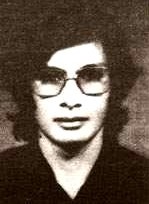
Charles Sobhraj in 1975
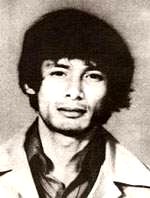
Charles Sobhraj
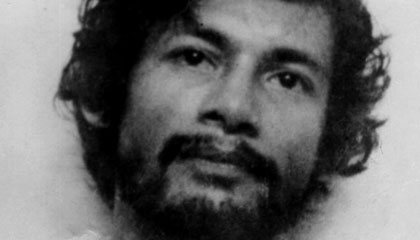
Charles Sobhraj
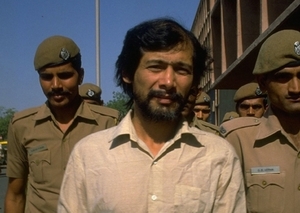
Charles Sobhraj
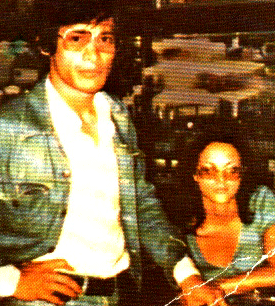
Charles Sobhraj
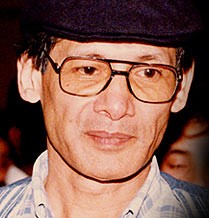
Charles Sobhraj
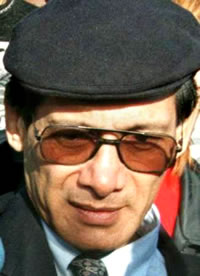
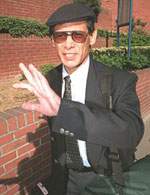
Charles Sobhraj
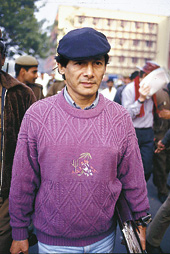
Charles Sobhraj
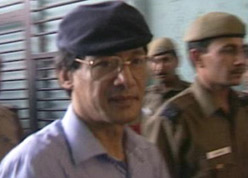
Charles Sobhraj
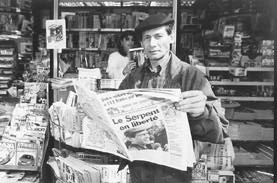
Charles Sobhraj
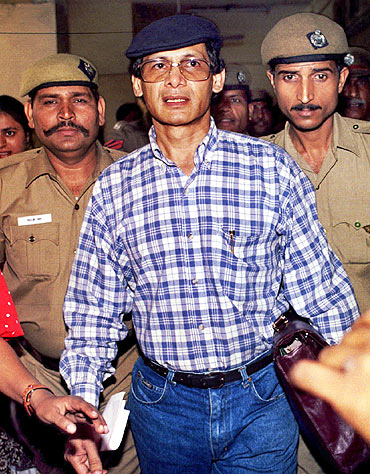
Indian policemen escort Charles Sobhraj as he leaves a New Delhi court in 1995.
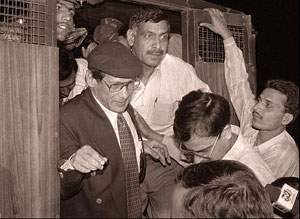
Charles Sobhraj
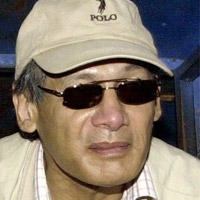
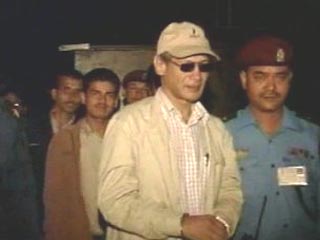
Charles Sobhraj
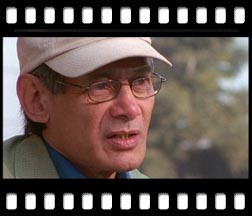
Charles Sobhraj
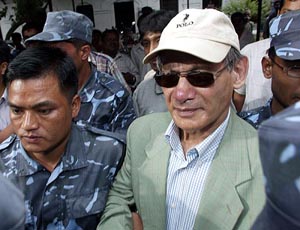
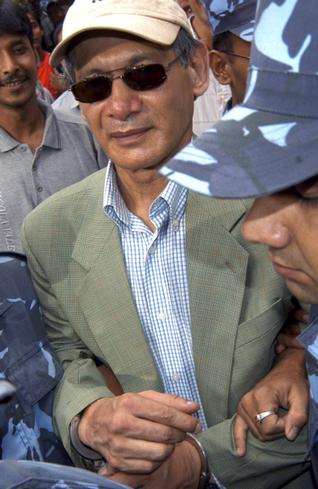
Charles Sobhraj

A.K.A.: "The Serpent" - "The Bikini killer"
Classification: Serial killer
Characteristics: Poisoner - Robberies
Number of victims: 10 +
Date of murders: 1975 - 1976
Date of arrest: July 5, 1976 / September 19, 2003
Date of birth: April 6, 1944
Victims profile: Teresa Knowlton / Jennie Bollivar / Vitali Hakim / Henk Bintanja, 29, and his fiancée Cornelia Hemker, 25 / Charmayne Carrou / Laurent Ormond Carrière, 26 / Connie Bronzich, 29 / Avoni Jacob / Ajay Chowdhury / Jean-Luc Solomon
Method of murder: Poisoning - Drowning - Strangulation
Location: Thailand / Nepal / India / Malaysia
Status: Sentenced to 12 years in prison in India in 1976. Released on February 27, 1997. Sentenced to life imprisonment in Nepal on August 20, 2004
Sobhraj, Charles Gurmukh
Born Hotchand Bhawnani Gurmukh Sobhraj, in April 1944, Asia's premier serial slayer was the illegitimate son of a Vietnamese peasant girl and a wealthy Indian merchant living in Saigon.
Soon after his birth, Sobhraj's father married an Indian woman in Pooma, and his mother retaliated by wedding a French military officer when Sobhraj was four years old. The land of Indochina was in turmoil at the time, with French colonial troops fighting a hopeless rear-guard action against Viet Minh communist rebels, and Hotchand Sobhraj witnessed countless acts of violence before his step-father took the family to France in 1953.
Sobhraj hated Europe and the Catholic boarding school in Paris where he soon became the butt of racial jokes and insults. (The school's lasting mark was a name change - to "Charles" - after Sobhraj's clever impersonation of comedian Charlie Chaplin.)
At first, he expressed his displeasure through tantrums and persistent bed-wetting, twice running away to Saigon in his teens. Sobhraj's father sent him back each time, but finally agreed to pay his passage for a trial visit home. The ticket never came, and Sobhraj turned to robbery, landing briefly in jail on his second try.
He finally reached Vietnam on his own, but the family reunion was tense, and Sobhraj was soon packed off to live with relatives in India after wrecking his father's car. When he turned up in Saigon again, uninvited, Charles's father threw in the towel, sending him back to France. In Paris, Charles was locked up twice for auto theft, emerging from jail the second time with a short-lived desire to "go straight."
He married, found a job, but the straight life quickly palled. Jailed again for writing forged checks on his sister's account, Charles was freed when she dropped the charges. He continued bouncing checks thereafter, saving up some 30,000 francs before he took his wife to Bombay , setting up shop as an international con man and smuggler, specializing in the theft of passports from American and European tourists. Arrested for a jewel robbery in Delhi, Charles was granted bail in spite of an escape attempt.
He fled at once to Kabul, in Afghanistan, where he was jailed for auto theft and lesser charges. Another escape brought him back to France, where he kidnapped his infant daughter from his mother-in-law, leaving the woman drugged and locked in a hotel room. Sobhraj's first known murder victim was a Pakistani chauffeur named Habib, hired by Charles and a female companion in September 1972, for a drive between Rawalpindi and Peshawar.
Along the way, for reasons unknown, Charles injected Habib with a drug that took his life, then dumped the driver's body in a river. Warrants were issued for suspect "Damon Seaman," but another year would pass before Sobhraj was finally identified. Arresting him was something else. In November 1973, Sobhraj was in Istanbul, teaming up with his brother Guy to drug and rob wealthy tourists.
Both were arrested in Greece, but Charles managed another escape, leaving his brother in jail as he fled back to India. In Delhi, he entered the heroin trade, gaining a foothold in the cut-throat business with inside information procured - under drugs and torture - from a local pusher whom Sobhraj later killed.
Murder seemed to come easier each time. In October 1975, Sobhraj killed an American tourist, Teresa Knowlton, in his Delhi flat and had a sidekick dump her body. A Turkish competitor in the drug trade, Vitali Hakim, was beaten, his neck snapped, his corpse doused with gasoline and set afire. In Bangkok, Charles strangled Hakim's French contact, one Stephanie Parry. A month later, still in Bangkok, he strangled Dutch tourists Cornelia Hemker and Henricus Bitanja on December 16, burning their bodies as a hedge against arrest.
Shortly before Christmas, Canadian Laurent Carriere and American Connie Bronzick were found dead in Katmandu, their bodies burned. Sobhraj -traveling as Henricus Bitanja, with his victim's passport - had booked a room at the same hotel, but he slipped out of Nepal after preliminary questioning.
The killer continued his aimless trek across Asia, murdering Israeli Allen Jacobs for his passport at Varanasi, in northern India. A few days later, on January 9, 1976, Sobhraj and two accomplices drugged a trio of Frenchmen at Goa, dumping their bodies at roadside, but all three victims managed to survive.
In Hong Kong, Allen Gore was also lucky; he lost $8,000 but kept his life, despite a jolt of Sobhraj's chemical cocktail. Arrested with false passports in Bangkok, Charles was allowed to walk after doling out bribes all around. In Penang, he was arrested for trying to cash stolen traveler's checks, but he managed to talk his way out of jail. Back in Bombay, Sobhraj slipped a fatal mickey to French tourist Jean-Luc Solomon, moving on from there to more ambitious projects.
Shooting for the moon, he drugged an entire class of 60 French engineering students, but miscalculation of the dose sent 20 to a local hospital, and this time police were waiting.
Arrested on July 5, 1976, Sobhraj was linked with at least ten homicides spanning the past three years. Convicted of "culpable homicide" in the Solomon case, Sobhraj was sentenced to seven years at hard labor, with two more years tacked on for drugging the French students.
In 1982, he was sentenced to life imprisonment for the murder of Allen Jacobs, but appeals are continuing. Thailand and Nepal have announced their intention to file murder charges if Sobhraj should manage to win his release.
Michael Newton - An Encyclopedia of Modern Serial Killers - Hunting Humans
Hatchand Bhaonani Gurumukh Charles Sobhraj (born April 6, 1944), better known as Charles Sobhraj, is a serial killer of Indian and Vietnamese origin, who preyed on Western tourists throughout Southeast Asia during the 1970s. Nicknamed "the Serpent" and "the Bikini killer" for his skill at deception and evasion, he allegedly committed at least 12 murders.
He was convicted and jailed in India from 1976 to 1997, but managed to live a life of leisure even in prison. After his release, he retired as a celebrity in Paris; he unexpectedly returned to Nepal, where he was arrested, tried and sentenced to life imprisonment on August 12, 2004. The Supreme Court of Nepal has finally convicted him and ordered the life imprisonment, this decision was made on 30 July 2010.
While Sobhraj is widely believed to be a psychopath — he has a manipulative personality and is incapable of remorse — his motives for killing differed from those of most serial killers. Sobhraj was not driven to murder by deep-seated, violent impulses, but rather for personal gain, as a means among many to sustain his lifestyle of adventure. That lifestyle, as well as his cunning and cultured personality, made him a celebrity long before his release from prison. Sobhraj immensely enjoyed the attention, charging large amounts of money for interviews and film rights; his life has already been the object of four books and three documentaries. This search for attention and overconfidence in his own intelligence are named as causes of his unexpected return to one of the few places on Earth where authorities were still willing and able to arrest him, and his subsequent downfall.
Early years
Sobhraj was born Gurmukh Sobhraj in Saigon to an unwed Vietnamese mother and an Indian (Sindhi) father who soon deserted the family, for which the mother blamed the child. Stateless at first, he was then adopted by his mother's new boyfriend, a French lieutenant stationed in Indochina, but was not given as much attention as the couple's later children. Moving back and forth between France and Indochina with his family, feeling at home in neither place, Sobhraj developed discipline and personality problems growing up and soon turned to petty crime as a teenager.
Sobhraj got his first jail sentence (for burglary) in 1963 at Poissy prison near Paris. He weathered the harsh detention conditions using a combination of self-defense and manipulation. The latter earned him special favors from prison officials, such as keeping books in his cell, and endeared him to visitor Felix d'Escogne.
When paroled, Sobhraj moved in with d'Escogne and shared his time between the high society of Paris and the criminal underworld. He started to accumulate money through a series of scams and burglaries, and began a relationship with Chantal, a woman from a conservative Parisian family. He was arrested for evading police in a stolen car on the very night he proposed to her, and sent back to Poissy for eight months, while a supportive Chantal waited for him.
Sobhraj and Chantal were married upon his release. Soon after, facing mounting suspicions by French authorities, he and a now pregnant Chantal left France for Asia to escape arrest. Traveling through Eastern Europe using fake documents and robbing people who befriended them, they arrived around 1970 in Bombay, where Chantal gave birth to a baby girl.
The couple made a good impression on the expatriate community in India, while Sobhraj resumed his criminal lifestyle by running a car theft and smuggling operation, the profits of which were plowed into his growing gambling addiction. A botched armed robbery at a jewelry store in Hotel Ashoka in 1973 led to his arrest and imprisonment. Faking illness, he escaped with Chantal's help, but both were captured shortly after. Borrowing money from his father in Saigon to bail them out, they fled India for Afghanistan.
In Kabul, the couple resumed their habit of robbing tourists following the "hippie trail." Arrested once again, Sobhraj escaped in a similar manner as in India, pretending illness and drugging the hospital guard, then fleeing to Iran, leaving his family behind. Chantal, although still loyal to him, wanted to leave their criminal past behind, and returned to France, vowing to never see him again.
Sobhraj spent the next two years on the run, using as many as 10 stolen passports and visiting several countries in East Europe and the Middle East. He was joined in Istanbul by his younger brother André, who quickly became a pawn in many crimes in Turkey and Greece; both were eventually arrested in Athens. After an identity-switch plan gone awry, Sobhraj escaped in his usual manner, leaving his brother to serve an 18-year sentence after being turned over to the Turkish police by Greek authorities.
Murders
On the run again, Sobhraj financed his lifestyle by posing as a mysterious drug dealer to impress tourists and defrauding them when they let their guard down. In Thailand, he met Marie-Andrée Leclerc from Lévis, Quebec, one of many tourists looking for adventure in the East. Subjugated by Sobhraj's personality, Leclerc quickly became his most devoted follower, turning a blind eye to his crimes and philandering with local women.
Sobhraj started gathering followers by helping them out of difficult situations, indebting them to him while he actually was the very cause of their misery. In one case, he helped two former French policemen, named Yannick and Jacques, to recover their passports that he himself had stolen; in another, he provided shelter and comfort to another Frenchman named Dominique Rennelleau, whose apparent dysentery illness was actually the results of poisoning by Sobhraj. He was also joined by a young Indian named Ajay Chowdhury, a fellow criminal who became his lieutenant. Sobhraj wanted to start a criminal "family" of sorts, in the style of Charles Manson's.
It was then that Sobhraj and Chowdhury committed their first (known) murders in 1975. Most of the victims had spent some time with the "clan" before their deaths and were, according to some investigators, potential recruits who had threatened to expose Sobhraj. The first victim was a young woman from Seattle, Teresa Knowlton, who was found burned like many of Sobhraj's other victims. Soon thereafter, a young American Jennie Bollivar, was found drowned in a tidal pool in the Gulf of Thailand, wearing a flowered bikini. It was only months later that the autopsy and forensic evidence revealed the drowning to be murder.
The next victim was a young, nomadic Sephardic Jew named Vitali Hakim, whose burned body was found on the road to the Pattaya resort where Sobhraj and his clan were staying.
Dutch students Henk Bintanja, 29, and his fiancée Cornelia Hemker, 25, were invited to Thailand after meeting Sobhraj in Hong Kong. Just as he had done to Dominique, Sobhraj poisoned them, and then nurtured them back to health to gain their obedience. As they recovered, Sobhraj was visited by his previous victim Hakim's French girlfriend, Charmayne Carrou, coming to investigate her boyfriend's disappearance.
Fearing exposure, Sobhraj and Chowdhury quickly hustled the couple out; their bodies were found strangled and burned on December 16, 1975. Soon after, Carrou was found drowned in circumstances similar to Jennie's, and wearing a similar-styled swimsuit. Although the murders of both women were not connected by investigations at the time, they would later earn Sobhraj the nickname of "the bikini killer."
On December 18, the day the bodies of Bintanja and Hemker were identified, Sobhraj and Leclerc entered Nepal using the couple's passports. There they met and, on December 21-22, murdered Canadian Laurent Ormond Carrière, 26 and Californian Connie Bronzich, 29. (The two victims were incorrectly identified in some sources as Laddie DuParr and Annabella Tremont.) Sobhraj and Leclerc then returned to Thailand, once again using their latest victims' passport before their bodies could be identified.
Upon his return to Thailand, Sobhraj discovered that his three French companions had started to suspect him, found documents belonging to the murder victims, and fled to Paris after notifying local authorities.
Sobhraj then went to Calcutta, where he murdered Israeli scholar Avoni Jacob for his passport, and used it to move to Singapore with Leclerc and Chowdhury, then to India and - rather boldly - back to Bangkok in March 1976. There they were interrogated by Thai policemen in connection with the murders, but easily let off the hook because authorities feared that the negative publicity accompanying a murder trial would harm the country's tourist trade.
Not so easily silenced, however, was Dutch embassy diplomat Herman Knippenberg, who was investigating the murder of the two Dutch backpackers, and suspected Sobhraj even though he did not know his real name. Knippenberg started to build a case against him, partly with the help of Sobhraj's neighbour. Given police permission to conduct his own search of Sobhraj's apartment (a full month after the suspect had left the country), Knippenberg found a great deal of evidence, such as victims' documents and poison-laced medicines. He would from then on accumulate evidence against Sobhraj for decades, despite the lack of cooperation by law enforcement.
The trio's next stop was in Malaysia, where Chowdhury was sent on a gem-stealing errand, and disappeared after giving the jewels to Sobhraj. No trace of him was ever found, and it is widely believed that Sobhraj murdered his former accomplice before leaving with Leclerc to sell the jewels in Geneva.
Soon back in Asia, Sobhraj started rebuilding his clan, starting in Bombay with two lost Western women named Barbara Sheryl Smith and Mary Ellen Eather. His next victim was Frenchman Jean-Luc Solomon, who succumbed to the poison intended to incapacitate him during a robbery.
In July 1976 in New Delhi, Sobhraj and the three women tricked a tour group of post-graduate French students into accepting them as guides. He then drugged them with pills which he pretended were anti-dysentery medicine. However, when the drugs started acting too quickly and the students started dropping unconscious where they stood, three of them quickly realized what was happening and overcame Sobhraj, leading to his capture by police. During interrogation, Barbara and Mary Ellen quickly cracked and confessed everything. Sobhraj was charged with the murder of Solomon, and all four were sent to Tihar prison outside New Delhi while awaiting formal trial.
Prison time
Conditions inside the notorious prison were unbearable; both Barbara and Mary Ellen attempted suicide during the two years before their trial. Sobhraj, however, had entered with precious gems concealed in his body and was experienced in bribing captors and living comfortably in jail.
Sobhraj turned his trial into a show, hiring and firing lawyers at whim, bringing in his recently-paroled and still-loyal brother André to help, and eventually going on a hunger strike. He was nonetheless sentenced to 12 years in prison instead of the expected death penalty. Leclerc was found guilty of the drugging of the French students, then later paroled and returned to Canada when she developed ovarian cancer. She was still claiming her innocence, and reportedly still loyal to Sobhraj, when she died at home in April 1984.
Sobhraj's systematic bribery of prison guards at Tihar reached outrageous levels. He led a life of luxury inside the jail, with TV, and gourmet food, having befriended both the guards and the prisoners. He would walk in and out of jail whenever he wanted. Revelling in his notoriety, he gave interviews to Western authors and journalists, such as Oz magazine's Richard Neville in the late 1970s, and Alan Dawson in 1984. He freely talked about his murders, while never actually admitting to them, and pretended that his actions were in retaliation against Western imperialism in Asia, an excuse which most criminologists find highly doubtful.
He also needed to find a way to prolong his sentence, since the 20-year Thai arrest warrant against him would still be valid on his intended release date, leading to his deportation and almost certain execution. So in March 1986, on his tenth year in prison, he threw a big party for his prisoner and guard friends and, having drugged them with sleeping pills, walked out of the jail.
Sobhraj was quickly caught in Goa and had his prison term prolonged by 10 years, just as he had hoped. On February 17, 1997, 52-year old Sobhraj was released, with most warrants, evidence and even witnesses against him long lost. Without any country to deport him to, Indian authorities let him return to France.
Celebrity and re-capture
Sobhraj then lived in the suburbs of Paris, enjoying a comfortable retirement. He hired an agent and charged thousands of dollars for interviews and photographs, and upwards of $15 million for a movie deal based on his life. Meanwhile, families of victims, and investigators such as Knippenberg, despaired of seeing justice served.
Then, on September 17, 2003, Sobhraj was unexpectedly spotted by a journalist in a street of Kathmandu and quickly reported to the local authorities. He was arrested two days later by Nepalese police in the casino of the Yak and Yeti hotel. On August 20, 2004, the Kathmandu District Court sentenced him to life imprisonment for the 1975 murders of Bronzich and Carrière. Most of the evidence against him came from the painstaking accumulation of documents by Knippenberg and Interpol.
Sobhraj's motives for returning to Nepal remain unknown, although arrogance and need for attention likely had a part in it. He appealed the conviction, claiming he was sentenced without trial. In September, his lawyer announced Sobhraj's wife in France would file a case against the French government before the European Court of Human Rights, for refusing to provide him with any assistance. His conviction was confirmed in 2005 by Kathmandu's Court of Appeals.
Current status
In late 2007, news media reported that Sobhraj's lawyer had appealed to the current French president, Nicolas Sarkozy, for intervention with Nepal.
In 2008, Sobhraj announced his engagement to Nihita Biswas (aged 20) from Nepal. On 7 July 2008, issuing a press release through his fiancée Nihita, he claimed that he was never convicted of murder by any court and asked the media not to refer to him as a serial killer. Later, it was claimed that he married his fiancée on October 9, 2008, on the occasion of Bada Dashami, a Nepalese festival, in a much famed, but not publicised, wedding that took place in the jail itself.
On the following day, Nepalese jail authorities dismissed the claim of his marriage. They said that Nihita and her family had been allowed to conduct a tika ceremony, along with the relatives of hundreds of other prisoners. They further claimed that it was not a wedding but part of the ongoing Dashain festival, when elders put the vermilion mark on the foreheads of those younger to them to signify their blessings.
In July 2010, the Supreme Court of Nepal postponed the verdict on an appeal filed by Sobhraj against a district court's verdict sentencing him to life imprisonment for the murder of American backpacker Connie Jo Bronzich in 1975. Sobhraj had appealed against the district court's verdict in 2006, calling it unfair and accusing the judges of racism while handing out the sentence.
On July 30, 2010 the Nepalese Supreme Court upheld the verdict issued by the district court in Kathmandu of a 20-year life term for the murder of US citizen Connie Jo Bronzich and another year plus a Rs 2,000 fine for using a fake passport to travel. The seizure of all his properties was also ordered by the court. His mother-in-law/lawyer and his wife, Nihita, expressed that they were dissatisfied with the verdict and Thapa claimed that Sobhraj had been "denied" justice.
Sobraj currently has another case pending against him in the Bhaktapur district court for the murder of Laurent Armand Carrière, a Canadian-born tourist.
Pop culture
In the episode "Slither," part of the fifth season of Law & Order: Criminal Intent, the character of Bernard Fremont (played by Michael York) is clearly based on Charles Sobhraj. Fremont is killed (offscreen), most likely by his former lover and accomplice Nicole Wallace (played by Olivia d'Abo), who may have been partly based on Leclerc or Chantal.
Bibliography
Julie Clarke & Richard Neville (1980). The Life and Serious Crimes of Charles Sobhraj. Pan Macmillan. ISBN 0-330-27001-X.
Thomas Thompson (1979). Serpentine. Carroll & Graf Publishers. ISBN 0-7867-0749-6.
Julie Clarke & Richard Neville (1989). Shadow of the Cobra. Penguin Books Ltd. ISBN 978-0140129373.
Farrukh Dhondy (2009). The Bikini Murders. Harper Collins India
Films
The made for TV movie Shadow of the Cobra (1989) is based on Sobhraj
Charles Sobraj: The Tale of the Serpent
Crime Does Pay
Imagine that you could earn nearly a million dollars for every year you spent in prison with the understanding that you would likely get out in the prime of your life. Would you take that deal?
More specifically, suppose you could live like royalty behind bars, in almost total control, with guests free to come and go as they pleased, cellphones, TV, gourmet food and fine wine to eat and drink. Would that make the deal worth 20 years of your life?
For serial murderer Charles Sobhraj, the idea of retiring to Paris and making $15 million for a movie deal based on his life made spending more than two decades in a notoriously corrupt Indian prison worthwhile. Sobhraj, a Vietnamese-Indian by birth and French national by adoption, turned a sentence for homicide in India into almost a life of leisure while at the same time evading prosecution for a dozen murders in jurisdictions that should have brought a death sentence.
He was a con man, jewel thief, drug dealer and murderer, but one who lived a life of adventure and intrigue that made him a media celebrity. He amassed enough money to bribe his captors who provided him with amenities to make life in an Indian prison more bearable. For most of his incarceration he had access to typewriters, a television, refrigerator and a large library. That's in addition to the drugs and food that he used to entertain and control his fellow inmates in the prison that was supposed to be the harshest in India.
Even more vexing was the idea that, at 52 years old, Sobhraj could walk out of Delhi's Tihar prison, sign a $15 million deal for his life story and then charge the media upwards of $5,000 an interview once he returned to Paris.
Not bad for a man who was convicted of one homicide and accused of committing at least 10 more. Some authorities believe Sobhraj killed more than 20 unsuspecting European and American tourists and pilgrims who journeyed to the Far East and the subcontinent. Some came east in search of drugs and others came in search of spiritual growth. Instead, they found Charles Sobhraj and his gang of killers.
Sobhraj wanted to create a family-like cult of sorts with himself as the father figure, says Dutch diplomat Herman Knippenberg, who spent years trying to bring Sobhraj to justice. Knippenberg said Sobhraj wanted to create "his own family of Charles Manson-like characters, with himself as the father. The ones he killed were the people who saw through his mask and who tried to get away."
Today, you may be able to find Charles Sobhraj idling away his days in a Paris bistro and for a fee he may even sit down and talk about his life.
He has slipped easily into the life of a celebrity, with mainstream publications willing to pay for posed pictures of the murderer enjoying the good life. In the words of his agent: "No money, no meeting."
The friends and relatives of his victims only hope that karma -- the concept that says the collective force of a man's actions dictates his destiny -- isn't done yet with Charles Sobhraj.
Motive
Early childhood abuse, injury to the brain -- usually the frontal lobes -- and extremely indifferent or cruel parenting are often found in the backgrounds of serial killers. But what made Charles Sobhraj evolve into a psychopath? Could the constant travel back and forth between his natural parents and the ensuing rejection be enough to drive a man to serial homicide? Recent scientific research into the minds of psychopaths provides a different theory.
"Until the psychopath came into focus, it was possible to believe that bad people were just good people with bad parents or childhood trauma and that, with care, you could talk them back into being good," writes journalist Robert Hercz. “(Noted criminologist Bob Hare's research suggested that some people behaved badly even when there had been no early trauma.")
A professor at the University of British Columbia, Hare has spent years studying psychopaths to try to address what has turned out to be a common malady. Through decades of research, interviewing and conducting experiments on some of society's most notorious criminals, Hare developed a commonly used measurement scale to determine a subject's level of "psychopathy." What he has learned is troubling.
"Hundreds of thousands of psychopaths live and work and prey among us. Your boss, your boyfriend, your mother could be what Hare calls a 'subclinical' psychopath, someone who leaves a path of destruction and pain without a single pang of conscience," Hercz writes. "Even more worrisome is the fact that, at this stage, no one -- not even Bob Hare -- is quite sure what to do about it."
Hare's research helps explain the behavior of men like Charles Sobhraj. Unlike many serial killers, Sobhraj killed for economic and personal gain. He only wanted the passports and identity papers of his victims because that made it easier for his jewel and drug smuggling operations. Sobhraj wasn't driven to kill by perverse sexual desire, nor did he get any particular satisfaction out of homicide. The people he murdered were merely in the way. They had something that Sobhraj wanted and so he took it.
“If I have ever killed, or have ordered killings, then it was purely for reasons of business, just a job, like a general in the army,” Sobhraj told journalist Richard Neville during his trial in India.
Psychopaths like Sobhraj are incapable of feeling remorse. To them, the phrases "I want to kill you" and "I want to kiss you" carry the same emotional punch. The concept of fear is almost unknown to them, so threat of punishment will never be a deterrent.
Within the psychopath diagnosis is a subdivision of behavior that analysts call "the puppet master." This class is made up of men like Charles Sobhraj, although killers like Charles make up only a small portion of the puppet masters out there.
"The puppet master would manipulate somebody to get at someone else. This type is more powerful because they're hidden," Hare said.
Industrial psychologist Paul Babiak attributes a trio of motivations to psychopaths: thrill-seeking, an almost insatiable desire to win, and the propensity to injure others. "They'll jump on any opportunity that allows them to do those things," he says. "If something better comes along, they'll drop you and move on."
In one of Charles Sobhraj's earliest encounters with crime, he once explained to his mother that he could "always find an idiot to do what I wanted." The comment came when 10-year-old Charles was accused of inducing a stepbrother to rob a shopkeeper.
Hare talks about how imprisoned psychopaths learn "the words but not the music" that parole boards and society want to hear. "They can repeat all the psychiatric jargon -- 'I feel remorse,' they talk about the offense cycle -- but these are words, hollow words."
Abandonment
The constants in Charles Sobhraj's formative years were abandonment and second-class status. Born Gurhmuk Sobhraj to an unwed Vietnamese woman, Sobhraj grew up feeling his parents' indifference to his existence. His mother, Song, was abandoned by the Indian tailor soon after her first son was born and she blamed him for her lover's dismissal.
His father wanted little to do with Gurhmuk during the boy's childhood, but the youngster twisted it around in his head to believe that his father was a mythic, heroic figure.
Eventually Song met up with a French officer stationed in French Indochina and they were wed. The soldier, Lieutenant Alphonse Darreau, was willing to adopt Song's son, but not to give the boy his name. Darreau was kind to Sobhraj, but as other children were born to Darreau and Song, Gurhmuk began to feel more and more an outsider in his own home. For his part, Darreau, who had suffered shell shock during a battle and for the rest of his life was in and out of hospitals for post-traumatic stress disorder, looked at Sobhraj as a drain on scarce family resources.
A child shunned in such a way will eventually do things to gain attention. For neglected children, even negative attention is considered better than no attention at all, and Charles (he took the name as a teenager after being baptized a Catholic) was no different. From an early age he was disobedient and delinquent. He was a smart, charismatic youngster, but his grades suffered and he was often absent from school.. When he did show up Charles was a discipline problem for his schoolmasters.
Living in Marseilles, Charles had access to ships heading east to Indochina and he began stowing away on them in an effort to reach his natural father. The affection Charles held for his father was not returned, however. Several times the boy managed to make it out of Marseilles only to be discovered while at sea and returned to port -- at no small cost to his mother or father, depending on who could be convinced to pay the boy's fare.
Charles bounced back and forth between the Orient and Europe, at home in neither place. The geographic cure his parents hoped for never occurred, because wherever Charles went he took his psychopathic personality. He was uncontrollable and as he reached his late teens his family became unwilling to bail him out of trouble.
When he was arrested for burglary in Paris and sentenced to three years behind bars, he went to prison, estranged from his family. Alone, without anyone who cared whether he lived or died, Sobhraj was determined to make his family and all society pay for throwing him away.
Some consider this need for vengeance a pretense.
“His claims that his life was a protest against the French legal system or that his love for Vietnam and Asia motivated his criminal career are absurd, but as tools of psychological manipulation they were very effective,” Neville wrote.
Felix
The year 1963 would be the first of many behind bars for Sobhraj, and he quickly adjusted to life in prison. It was brutal and cruel, and a small half-Asian teen like Charles should have been fresh meat for predators in jail. However, Charles knew karate and he used it to defend himself.
Poissy Prison near Paris was a terrible place. It was built in the 16th century as a convent and converted into a prison by the agnostics of the French Revolution. High stone walls separated prisoners from the outside world, and the individual cells were so small they were used only for sleeping -- during the day the prisoners were lumped together in pens sorted into groups based on their ferocity, sanity and nationality.
"It is a horror," Sobhraj biographer Thomas Thompson quotes a visitor as saying. "One enters the place and chills pass through the bones like stepping into a cellar. Each moment I am inside, I am repelled."
Sobhraj's behavior in jail was indicative of things to come. Prisoners were forbidden to keep books in their cells, but not Charles. Infractions that would have brought harsh punishments were not enforced around Sobhraj, and he portrayed himself as so pathetic he attracted the special attention of one of the volunteers who visited prisoners. The man, Felix d'Escogne, was a wealthy young man who came to Poissy each week to help prisoners with letters, resolve simple legal issues and to provide companionship. Charles quickly latched on to Felix, whom he treated as a savior and role model.
The men struck up a friendship during the time Charles was imprisoned and Felix even tried to reconcile father and son, as well as Charles with his mother, with limited success. He provided Charles with reading material, emotional stability and encouragement as the young man idled away his days in Poissy.
After he was paroled, he moved in with his friend Felix and resumed his criminal lifestyle, but he was much more adept and cautious. He straddled two very different worlds. In one, the bright world of Felix d'Escogne, was filled with work and service, and interaction with some of the best Parisian families. The other world was the darker, more sinister place where Charles Sobhraj felt at home -- the Parisian underworld.
Charles' own self-destructive behavior sent him back to jail on the very night he proposed to his fiancee. He had stolen a car and taken the woman, Chantal, to a glamorous casino. Crazed, almost frenzied wagering caused him to lose thousands of borrowed francs for which he blamed Chantal, who had put off his requests to marry him. Later, with Chantal white with fear beside him, he sped home at breakneck speed until Chantal agreed to be his bride.
It was at that time he noticed les flics in the patrol car behind them, siren wailing and lights flashing. He tried to evade the police but lost control on a rain-soaked curve and crashed the car. He was arrested and sent back to Poissy for eight months for evading police in a stolen car.
At the time of his sentencing, Felix wrote a warning to the judge, advising that mandatory psychological counseling be part of any sentence. He explained his request by listing some of Sobhraj's behaviors.
"He exploits 100 percent the weaknesses of those around him," Thompson reports that Felix wrote the judge. "He has a small conscience, if any ... is capable of politeness, but calculatedly so. Impulsive and aggressive."
Chantal
Chantal was a beautiful young Parisian woman living at home with her parents when she met Charles Sobhraj at a party. Instantly she was taken with the erudite, well-heeled young man who told her of his adventures in the Orient and Dakar and his fictitious wealthy family back in Saigon.
He spoke like a poet and courted young Chantal, despite her parents' initial disapproval of their daughter's new beau. There was no way her father, a traditional French Catholic, would allow his daughter to marry a Vietnamese half-breed, no matter how rich he said his family in Vietnam was. But Chantal was smitten and when Sobhraj was sent back to prison for an additional eight months, she stood by him, pledging chastity and telling her friends and co-workers that her boyfriend had been called up by the military.
Constitutionally unable to see fault with himself, Charles blamed the world for his latest run-in with the law. He did his time quietly, but in a series of letters to Felix, he denied responsibility for his actions.
By the time he was released eight months later, Sobhraj had built up a rather nice nest egg through a series of scams. The money made Chantal's parents a little more amenable to their daughter marrying Charles and they were wed in a simple civil ceremony attended by representatives of both families.
Shortly afterward, Chantal revealed she was pregnant. At the same time Charles decided to leave Europe and head to the Orient before the life of scams and cons he was living caught up with him. He was passing bad checks all over France and it was only a matter of time before the police realized that the common link to a rash of burglaries in wealthy homes was that Charles Sobhraj had recently been on the premises.
Asking Felix, who had re-entered his life, if he could borrow a car for a day or two, Charles loaded his worldly possessions and his pregnant wife and left France. The couple worked their way across Eastern Europe passing bad paper, robbing people who befriended them and leaving a trail of crimes and victims in their wake. By the time they reached Istanbul in Felix's stolen MG, authorities had been visiting their friends in Paris, looking for the couple. In Bombay, Chantal gave birth to a baby girl.
India
Charles and Chantal integrated into expatriate French society on the subcontinent. Charles, the highly personable and intelligent psychopath, was quickly accepted by some of the highest-ranking French citizens in India and Chantal, an attractive and personable young woman with an adorable baby was just as welcome at the women's teas and parties.
This early in their marriage, Chantal was still blissfully unaware of her husband's thieving ways. He would talk to her about his "business," and on more than one occasion she would act as unwitting accomplice to his schemes, but for a stretch of several months he operated successfully without police interference.
During much of 1970, Sobhraj operated a stolen car brokerage operation, obtaining hard-to-find American and European autos for homesick Frenchmen and wealthy Indians with a passion for Western cars.
Charles would either steal the cars or fence stolen cars in Pakistan or Iran then bring them over the border to India, greasing the palms of greedy Indian border guards who were willing to overlook the lack of import paperwork. He would gain legitimate title to the vehicles by turning them in as stolen and buying them back at auction. Then he would sell them to grateful friends at great profit.
His business put him on the road much of 1970 and 1971, leaving a lonely and homesick Chantal in Bombay often wondering where Charles had gone. To appease her, he brought her back beautiful jewelry from God knows where..
Charles' only weakness seemed to be compulsive gambling, and this disease would result in his second serious run-in with the law and ultimately his downfall.
Charles lost lots of money at the Macao casino, prompting a liquidation of the jewels he gave to Chantal. Pawning the jewelry was insufficient to pay his gambling debts, literally putting his life at risk from casino collectors who are much more ruthless than their American and European counterparts.
Luckily, Charles was introduced to a Frenchman who had a plan to obtain enough money for Charles to pay off his debts, but also to live quite comfortably for some time.
The jewel store robbery was doomed from the start. Breaking into a hotel room above a store in the swank Hotel Ashoka in Delhi, India, Charles and his crew intended to drill through the hotel floor and drop down into the store during the night. But after three days of drilling with little progress it was clear the plan would fail.
The criminals then lured the owner of the store, blissfully unaware of the drilling going on above his head, up to the room on the premise of meeting a rich client. Sobhraj obtained the keys to the store at gunpoint and proceeded to empty the cases.
Fleeing to the Delhi airport with a bagful of stolen gems, Charles was forced to abandon his loot at customs when the store owner escaped his bonds and notified police, who sealed off the airport. Charles left $10,000 in cash and even more in jewels as he returned empty-handed to Bombay.
Bombay was too appealing to a thief like Charles. Besides, Chantal and the baby were still there so he again took up his car theft scam. Shortly after returning to Bombay he was pulled over by police in a stolen vehicle and based on eyewitness identification, he was arrested for the attempted jewel robbery at the hotel. He was taken to Bombay's prison, Tihar, and from there he staged the first of his dramatic prison escapes.
Pretending to have a bleeding ulcer, Charles was taken to a local hospital where he was diagnosed as having appendicitis, even though there was nothing wrong with him. Recovering from a needless surgery, Charles convinced Chantal to help him escape from the hospital by drugging his guard. Chantal crawled under the covers in Charles' bed and took a dose of chloroform herself to allay suspicions that she had conspired to help her husband escape.
He was recaptured shortly after, and both Chantal, whose unconsciousness had failed to convince police of her "innocence," and Charles were taken into custody. Chantal was released shortly after on bail. Eventually Charles was able to post bail with money borrowed from his father in Saigon and they fled India.
Arrests and Escapes
In Kabul, Afghanistan, Charles supported his wife and child by running cons and robbing hippies who had come east following the hashish trail from Europe. The Sobhrajs lived comfortably in Kabul, but soon wanderlust struck Charles and he took his family to the airport. He had neglected, however, to pay the hotel for two months of rent and was arrested by Afghan police.
Again he plotted an escape. In Afghan prisons, inmates are responsible for obtaining their own food by employing runners, often young beggars. If an inmate has no money, he starves. Charles had his runner purchased a syringe with which he drew his own blood and drank it, making it look like he had an ulcer. Taken to the hospital, he managed to drug his guard once again and flee to Iran.
For the next year he flew around the Eastern Hemisphere in a scattered manner, never settling anywhere long enough to arouse the suspicions of the police, although he continued to support himself by theft.
He often traveled with as many as 10 passports, some bought, some stolen, and none with the name Charles Sobhraj. Charles no longer used his given name, instead he changed identity at the drop of a hat depending on the passport he held. He would later tell police that during 1972-1973 he traveled to Karachi, Pakistan, Rome, Teheran, Kabul, Yugoslavia, Bulgaria, and as far north as Copenhagen.
Abandoning his family in Kabul, Charles saw his marriage end. The loyal Chantal, now with a dossier of her own in the massive Interpol database, had had enough of her criminal husband and left for France. Once there, she prayed she would never see Charles Sobhraj again.
By the time Chantal fled to Paris, the places Charles Sobhraj could travel to were quickly becoming limited. He was joined in Istanbul by his younger brother Andre -- the same person he had called "an idiot willing to do his bidding" as a 10-year-old -- who became an active participant in Charles' scams. Andre pledged obeisance to his older brother when Charles told him he could never return to France because of his criminal record, but the younger man suggested they find other countries in Europe to plunder.
Looking East, Charles told Andre he saw a world where he could blend into the crowd -- his Indian-Vietnamese heritage allowed him to portray any nationality he wanted -- and where police were more "accommodating" if the price was right. Rejecting Andre's suggestion that they return to Europe, Charles decided to return to the Orient.
Ultimately, Andre would pay dearly for his foolish desire to follow his brother. They pulled a couple of minor heists in Turkey, then fled to Greece when things got too hot and robbed a few tourists in Athens before they were arrested following a minor jewel robbery. Charles banked on the hope that the Greeks and Turks, historic enemies, would never share information about the two brothers who preyed on tourists.
Charles convinced Andre that it would be easy to make authorities think Charles was Andre and Andre Charles. Sobhraj was a wanted man, and if he pretended to be Andre -- whose crimes were minor in the eyes of Greek justice -- he could walk out of prison in a few weeks. Later, when he was safely across the frontier, Andre could tell the Greeks that he was the real Andre Darreau and that they had released the wrong man. They would then let him free.
The plan nearly worked, but when the Greeks decided to throw the book at the two men, Charles was forced to fall back on another plan. Once again feigning illness, he managed to escape from a police van taking him from a hospital to prison and he disappeared.
In a few days, Andre went to the warden and revealed that they had let Charles Sobrhaj, not Andre Darreau, escape. Sadly for him, the angry Greeks opted to turn Andre over to their Turkish enemies, who were not prepared to be lenient. After a trial, Andre was convicted of theft and sentenced to 18 years at hard labor.
The Poisoner
With his brother languishing in a Turkish prison, Charles fled eastward. He flitted around India, Kashmir, Iran and the Near East operating small-time scams and frauds. His typical modus operandi was to find a French or English-speaking tourist couple, befriend them and impress them as a mysterious, wealthy dealmaker and either use them as jewel couriers or steal their bankrolls, passports and travel tickets.
As he was perfecting this scheme he met the woman who would become his closest confidant and accomplice. She was Marie LeClerc, and she had come to the East looking for adventure. She found it with Charles Sobhraj.
Charles met Marie, a French Canadian, while she was sightseeing, and managed to convince her to return to Bangkok after her vacation ended. When Marie returned to the Orient with a satchel full of love letters Charles had written her during their months apart, she was shocked to find that he had linked up with a Thai woman named May, whom he had described as his “secretary.”
Marie's love for Charles was pathological. She was unable to see any evil in him and was even willing to put up with his dalliances. Years later, as she languished in Tihar Prison awaiting trial, she wrote to Charles (who had found a new lover): "Roong is twelve years younger than I, and fresher. You need a woman who can live under any conditions, any climate. As for me, I'm old, tired, rarely dynamic or smiling, with a bitter character that can't adapt due to my advanced age ... Roong must remain with you. The important thing is that you don't find yourself alone, that you have someone who loves you."
Undoubtedly, Sobhraj believed there was enough of him to share between two women. Somehow, Charles convinced Marie to become his partner in crime and they met up with an Australian professor and his wife who were vacationing in Thailand. Inserting himself into their lives, Charles skillfully won over the Australians who thought they had discovered a real friend. Charles and Marie served the Aussies coconut milk laced with powerful sedatives. When the couple was asleep, Charles ransacked their hotel room, stealing several thousand dollars in cash, as well as their passports, wedding rings and plane tickets.
Just as another man named Charles had done half a world away a few years before at the Spahn Ranch in California, Sobhraj began building a "family" of sorts, with himself as the head. As May floated around the periphery, Charles and Marie took in a wandering French boy named Dominique. Over a period of days Charles subtly administered enough poison to make Dominique ill with what appeared to be dysentery. Charles graciously offered the use of his home while the boy recovered. Normally, dysentery resolves itself quickly (or kills its host through dehydration), but Dominique had a hard time recovering. In reality, Sobhraj was keeping Dominique off balance to make him dependent.
Once it was made clear that Dominique was in Charles' debt, and the boy accepted his position, his recovery accelerated. As the youth grew healthy, Charles added two more young men, Yannick and Jacques, former police officers in the French colonies. Rather than poison them, he wooed them with wine and song, and while they were enjoying a night out on the town with Marie, Charles slipped away and stole their passports and savings.
Do not worry, he assured the two frantic young men, they could stay with him while new passports were procured in Bangkok. Any remuneration would be worked out later.
The final addition to Charles' circle was a young Indian named Ajay Chowdhury. As cold as Charles, Ajay quickly became his lieutenant and accompanied him everywhere. Ajay was a confidant, accomplice and co-conspirator for Charles who could be counted on to come through in even the most delicate circumstances.
The Bikini Murders
After assembling his coterie, Charles Sobhraj began to kill. There were rumors that he had killed before but for the first time Charles began leaving a trail.
His first victim was an American pilgrim named Jennie Bollivar who had come east to find herself through meditation and immersion into a Buddhist lifestyle. Instead, she made the mistake of falling in with Charles and his crowd for a few days. Why Charles murdered Jennie isn't clear, but the Dutch diplomat Herman Knippenberg believes Sobhraj killed her after she refused to join his entourage and become a smuggler.
Jennie was found dead in a tide pool in the warm waters of the Gulf of Thailand, wearing a simple flowered bikini. At first it appeared the beautiful young woman had drowned after a night of hashish and beer, but months later when an autopsy was performed, the forensic evidence made it clear someone had held her head under water until she drowned.
The next victim was a young nomadic Sephardic Jew, Vitali Hakim, who like Jennie, had come east looking for life's meaning, but instead fell into Charles' trap and found death. Vitali moved in with the entourage and stayed for several days. He accompanied Ajay and Charles on a trip to a nearby resort town on the Gulf of Thailand and, according to Charles, opted to stay with friends he had met there. Yannick and Jacques were puzzled by this, because Vitali had left his clothes in a closet in the apartment and had turned over his passport and traveler's checks to Charles for safekeeping.
Several days later, a horribly burned body was found on the road to Pattaya -- the resort destination of Charles, Vitali and Ajay. The male body showed signs of having been beaten, but it was clear to police that the poor man had been alive when he was doused with gasoline and set ablaze. Police assumed the man had been set upon by Thai bandits and slain. They did not connect this murder with the death of Jennie Bolliver.
In December 1975, Vitali Hakim's friend came east looking for him. His hotel noted that Hakim had checked out several weeks earlier and never returned. Vitali had left a message for his girlfriend, however, and unwittingly drew another victim into Charles's murderous web. Charmayne Carrou, a French citizen, turned up dead in circumstances almost identical to Jennie's death. Apparently she traced Vitali's whereabouts to Charles Sobhraj and started asking too many questions. Months later when an autopsy was performed, officials discovered that Charmayne had been strangled, not drowned, and that she had been suffocated with such force that bones in her neck shattered.
Love and Death
Two couples were Charles' next victims. Although they were separated by time and space, they would share the same horrible fate at the hands of the man who had become known to police as the Serpent.
Henk Bintanja and his fiancée, Cornelia "Cocky" Hemker, were Dutch students traveling around Southeast Asia when they met Charles Sobhraj in Hong Kong. He introduced himself as Alain Dupuis, a gem dealer, and quickly ingratiated himself with the two frugal Dutch. As a special favor, Charles sold Cocky a sapphire ring for $1,600 and invited them to his "luxurious villa" in Bangkok. He had to leave before them, he said, but would send a car and driver to meet them at the airport.
Henk and Cocky quickly met the same fate as so many others, mysteriously falling ill, and began recuperating at Charles' apartment. Charles took special care of the Dutch couple, locking up their valuables in his safe, along with their passports.
The night Charmayne Carrou appeared at Charles' apartment, Henk and Cocky were quickly hustled out of the building despite their illness. No one questioned Charles and Ajay when they returned a short time later smelling of gasoline and covered in dirt. Charles offered no explanation, but Dominique and the two former flics were becoming suspicious.
The Bangkok papers trumpeted the news about two tourists who had been bushwhacked by bandits and murdered. The man and woman had been strangled before their bodies were set ablaze. No identification had been found. The papers speculated about how the two doomed lovers met their fate for a few days until the discovery of a second drowned Western woman pushed the story off the front page.
Entering Nepal using Henk's passport, he met a pair of wandering Westerners in Katmandu. Laddie DuParr and Annabella Tremont met in Nepal and quickly became friends. Laddie had come from Canada to climb Mount Everest and Annabella was a restless California girl looking for meaning in her life. They spent a good deal of time in the section of Katmandu called "Freak Street" where anyone could buy anything from hashish to rubies. Laddie was biding his time until the weather cleared and Everest was climbable and Annabella was just biding her time.
Details are sketchy about how they met Charles Sobhraj in Katmandu, but it wasn't long before a man's body was found in a field, burned and slashed with a knife. While authorities were trying to identify the body -- it was clear it was a Westerner because of the size -- a second Westerner's body, positively identified as Annabella, was found nearby. She had been stabbed several times in the chest.
Police got their first lead when Nepalese customs reported that Laddie DuParr had left the country very shortly after the estimated time of Annabella's death. They surmised that Laddie had killed his new girlfriend and fled the country as soon as possible. They were confused, though, about the identity of the Western male who had been found nearby.
On the Run
Of course, it was not Laddie DuParr who fled Nepal after killing Annabella. Charles used Laddie's passport to fly home to Bangkok where he sold some jewels Laddie had purchased in Delhi. Then, using the passport of Henk Bintanja, he returned to Katmandu the next day. Police managed to trace the last few days of Laddie and Annabella and when they caught up with Charles, Marie and Ajay, the trio managed to bluff their way through questioning.
While he was in Bangkok, Charles had made a startling discovery. Dominique, Yannick and Jacques had put the pieces together and realized they had been under the care of a homicidal maniac. They broke into Charles' office and found dozens of passports and identity papers belonging to unfortunate tourists who had met up with Sobhraj. The three Frenchmen fled Sobhraj's apartment and Thailand, heading home to Paris. Before they left they told police what was going on in the apartment building.
On the run from Nepalese authorities, Charles and company crossed the border into India and made their way to Calcutta. They fit well in what is perhaps the most poverty-stricken place on the planet. Charles had no money, knew he was wanted by Nepalese police and could only guess what was waiting for him back in Bangkok. But he believed he was superhuman and that no mere mortal could bring him down. Charles had a plan. All he needed was a clean passport and some money.
He found both in the person of Israeli scholar Avoni Jacob who died in a run-down Calcutta hotel room where he had been drugged and strangled. Jacob's passport and traveler's checks -- about $300 in total -- were missing.
Using Jacob's passport, Charles led Ajay and Marie to Singapore. The three were so down on their luck that Marie was forced to use the passport of a Frenchman they had rolled. Charles assured Marie that no Indian border guard would know enough to question why she had been given a man's name, and he was right. Charles was always right.
And so he returned to Bangkok where he promptly drugged and robbed a rich American, stealing his identity. Although Avoni Jacob's papers were still usable, Charles had learned that it never hurt to have a spare passport. For some reason, luck was on his side, because the police, armed with the information from Yannick and friends, quickly brought the trio in for questioning for the bikini murders. It was a laughable, half-hearted investigation. The Thais were not interested in ruining their tourist trade by having a highly publicized trial.
The Dutch embassy, led by Herman Knippenberg, was adamant about having a full-scale investigation. Knippenberg was particularly driven to prosecute Sobhraj or Alain Gauthier, or Robert Grainer, or whoever this man pretended to be. The diplomat was convinced the man police had questioned was responsible for the deaths of at least two Dutch tourists.
It was not to be. Years before, Charles had told his brother that the Far East was the land of greased palms, where anything could be bought if the price was right. He proved it in early 1976 when he paid $18,000 to have a Thai police official look the other way while he and his cohorts fled the country.
They stopped briefly in Malaysia where Charles sent Ajay to the mining towns to procure some gems. Ajay returned with several hundred carats of jewels worth about $40,000. Charles intended to sell the jewels in Geneva to raise capital. But first he had to take care of one loose end.
No one knows exactly what happened to Ajay Chowdhury in Malaysia, but when Charles met Marie at the airport to catch their flight to Geneva, Ajay was not with him. She inquired as to his whereabouts but the look in Charles' eyes told her never to ask that question again. To this day, authorities believe Ajay Chowdhury, the partner-in-crime to so many of Charles' murders, had outlived his usefulness and lies buried somewhere in the steaming Malaysian jungle.
Interpol
Nothing so fragile as a life built on lies can stand for long, and it was just a matter of time before Charles Sobhraj was caught. He overestimated his own intelligence and underestimated law enforcement agencies in the Far East, believing it did not matter that Thai police were looking for Alain Galtier or even Laddie DuParr. He had outsmarted them before and he would again.
But when news of a serial killer in Thailand who was killing tourists emerged in the spring of 1976, the Thais knew they had to find Charles Sobhraj. Tourism is important to Thailand, and no 300,000 baht bribe could compete with the millions that would be lost if the people were afraid to come.
So far, two American women, two Canadians, a Turk, two Dutch citizens, a French woman, and an Israeli scholar had died in Southeast Asia under mysterious and similar circumstances. Calls for justice came from nearly every embassy.
Charles Sobhraj came to the attention of Interpol first in 1973 when he was linked with the aborted jewel robbery in the Hotel Ashoka. He was not linked to the Bikini killings in Thailand by Interpol -- they were looking for Alain Gautier -- but nonetheless Interpol's massive database contained quite a detailed dossier on Charles. Sooner or later every criminal slips up and even the most intelligent sociopath like Charles Sobhraj makes mistakes. When he did, Interpol was there to see it and the long arm of the law was there to make sure he did not escape again.
Catching the Serpent
In Bombay, Charles and Marie began working their scam again. Charles rebuilt his family by bringing in two lost Western women and made a quick score by drugging a Frenchman named Jean-Luc Solomon. Jean-Luc succumbed to the poison he had been given and died without regaining consciousness, turning a simple robbery into murder.
Charles, Marie, Mary Ellen and Barbara traveled to Delhi, where Charles wanted to run a scam. He quickly latched on to a tour group of French post-graduate students and became their unofficial guide around the city. The students considered themselves lucky to have found a fellow Frenchman in such a strange place, and when he offered them a pill that he said would ward off dysentery, many took it with gratitude.
His plan was to wait until the students became drowsy from his drug and then rob their rooms, but Charles' reach exceeded his grasp. The pills worked too quickly, and all around him in the lobby of the hotel, students were dropping like flies. When someone realized that the only people who were ill were those who took their new friend's "medicine," a trio of burly students wrestled Charles to the ground and sent for the police.
It was the beginning of the end for Charles Sobhraj.
Classic police work quickly rounded up the rest of Charles Sobhraj's crew and Barbara and Mary Ellen were the first to crack. They told everything they knew.
Charles held out during two weeks of intense questioning without changing his story that he was a French merchant and an important one at that. But even he grew tired in the face of the mounting evidence that was coming in from all corners of the globe.
The Thais had a warrant, good for 20 years, out for Charles for his murders there. Nepal was interested in speaking with him about some killings there. He had escaped from a Greek jail and an Afghan prison, and the Turks had imprisoned his brother for a crime they both committed. The French wanted nothing to do with him, as he had been exiled many years before. The Indians charged him with murder, for killing Jean-Luc Solomon.
The accused were taken to Tihar Prison outside Delhi.
Tihar Prison
For Marie and the two women, the deepest circle of Hell would have been better than Tihar Prison. Classified as murderers awaiting trial, their food consisted of bread and water with whatever else they could buy. The water came out of a standpipe in their cells once a day and if they weren't ready for it, they could wait for tomorrow's ration. Rats and insects knew no fear in Tihar Prison, as the convicts were usually too weak to put up much of a fight, so rodents ran brazenly through the bars of the cells. As for toilet facilities, those consisted of a hole in the corner of the cell. Marie's cellmate was a young Malaysian girl who had been arrested and then forgotten and who was slowly going insane.
But Charles wasn't bothered in the least. He knew how things worked in India and concealed in his body were more than 70 carats of precious gems. While his new home wasn't as comfortable as his apartment in Bangkok, it would do until he decided it was time to move on. Charles had no fear of being left to rot in Tihar; he knew eventually, he would buy his way out.
Times were tough in India during the mid-1970s. Indira Gandhi ruled with an iron fist through martial law, and conditions were harsh. The judicial system was clogged with political prisoners and criminals alike. As a result, nearly two years passed from the time that Charles Sobhraj and his clan were arrested before he and Marie went on trial. In the intervening months, Mary Ellen and Barbara had each tried to kill themselves out of despair. Charles, of course, was fine.
Charles Sobhraj's trial is worthy of a story in itself. It featured the return of Andre Darreau, who, having been granted early parole by the Turks, unbelievably traveled to India at Charles' request to help him escape. There was a mid-trial appeal to the Indian Supreme Court and a witness (Mary Ellen) recanting her statement of seeing Charles drug Jean-Luc. Sobhraj hired and fired lawyers at will and toward the end of the trial went on a hunger strike to protest the inhuman conditions at Tihar. He ended up defending himself.
The judge, however, was unimpressed with the theatrics and found Charles guilty of administering drugs with intent to rob, causing hurt to commit robbery and the Indian equivalent to manslaughter -- culpable homicide not amounting to murder.
Marie was found not guilty, but was returned to Tihar to await trial in the poisoning of the French graduate students. She would eventually serve some time for that crime and be released on mercy parole when she was diagnosed with ovarian cancer. She died at home in Canada, professing her love for the man who had ruined her life.
Charles faced the death penalty, and the prosecution argued strenuously for just that. It was well-known that he had killed many besides Jean-Luc Solomon, and that he undoubtedly would kill again. But Charles argued that time served in Tihar was punishment enough.
Did Charles manage to buy off the judge? That isn't known, but it is certainly a possibility. Around the world, law enforcement officials were astounded when the judge sentenced Charles Sobhraj to seven years in prison. The Serpent had emerged victorious once again.
Today
Charles was also convicted in connection with the abortive attempt to rob the French tourists and that 5-year sentence added to his seven-year term. The sentence, while obviously better than death, presented a problem for Sobhraj. The warrant from Thailand was good for 20 years, which meant that as soon as he was done serving his hitch in Tihar, he would be deported and very likely executed.
Twelve years would be enough time for witnesses to disappear or prosecutors to lose interest. But escape from Tihar, an easy feat for a man like the Serpent, meant he would be an international criminal and a wanted man. He needed a plan and had a few years to come up with a good one.
Biding his time, Charles literally ran Tihar. He wanted for almost nothing and counted both guards and prisoners as his friends. In fact, as he was finishing his 10th year behind bars, he threw a party for his friends. This time, it didn't matter when the sleeping pills took effect, and in the middle of his party, as cons and guards alike passed out from the drugs, Charles Sobhraj walked out of the jail.
He later said it wasn't his plan to flee the subcontinent, he just wasn't ready to leave Tihar yet and wanted to stay a few more years. So he arranged to be caught and was sentenced for the drug assault and escape. His gamble paid off. Over time, authorities around the world forgot about Charles Sobhraj and the case against him in Bangkok eventually withered away as witnesses died or evidence was lost.
On February 17, 1997, the Serpent walked out of Tihar Prison. He was in the prime of life, 52 years old. There was little chance that Thai officials could make a case against him so many years later, but Charles was a man without a country. He was to be deported from India, so he was kept in custody until authorities found a country that would take him.
In the end, he returned to France where today he charges reporters for interviews. In March 2002 an Indian film company announced that it was making a film about his life. The project is not exactly a Sobhraj biography "because we have taken some creative liberties, and because it’s not an exact biography of his life," the assistant director told Nihar Online, an Indian Web-based newspaper. ”The film will in no way glorify a killer. It is instead a question of man, morality and redemption."
The idea of redemption remains questionable. Several years into his incarceration in India, Charles was interviewed by an Australian writer. Vowing never to repeat his past mistakes, he stopped short of saying he would never kill again.
"I have already taken from the past what is best for me, what helps me live in the present and prepare for the future," he told Richard Neville. "If I play back a murder, it will be to see what I have learned from the method. I won't even notice the body."
SEX: M RACE: W TYPE: T MOTIVE: Sex./Sad.
DATE(S): 1972-76
VENUE: India/Nepal/Thailand
VICTIMS: 10-16+
MO: Career criminal; killed victims of robberies and swindles
DISPOSITION: Life term in India, 1982 (paroled to France, 1997).

Charles Sobhraj in 1975

Charles Sobhraj

Charles Sobhraj

Charles Sobhraj

Charles Sobhraj

Charles Sobhraj


Charles Sobhraj

Charles Sobhraj

Charles Sobhraj

Charles Sobhraj

Indian policemen escort Charles Sobhraj as he leaves a New Delhi court in 1995.

Charles Sobhraj


Charles Sobhraj

Charles Sobhraj


Charles Sobhraj


